#in any case if youre self described as 'straight' (straight not as in heterosexual but as in Not Queer)
Explore tagged Tumblr posts
Text

Quiet! This discussion is between the members of a marginalized group you hold privilege over and definetly not the place for you to chime in camarada
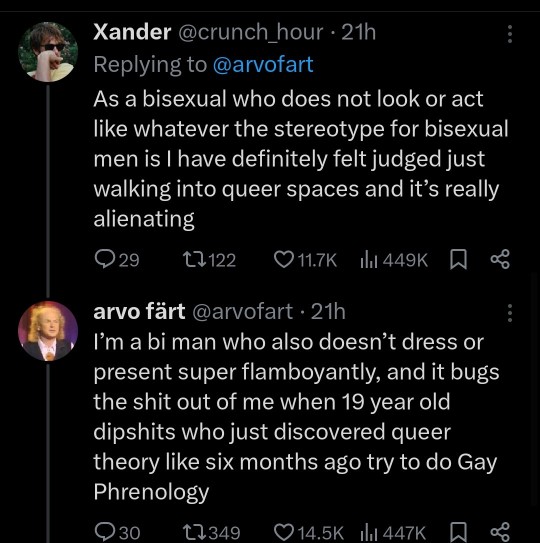
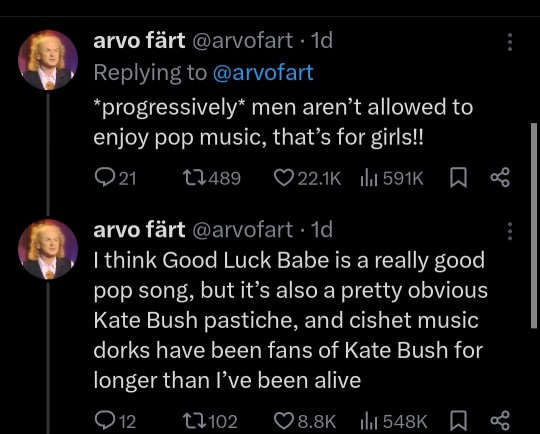
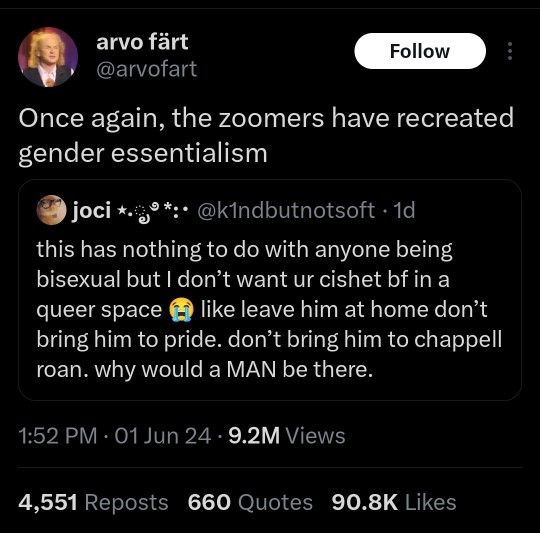
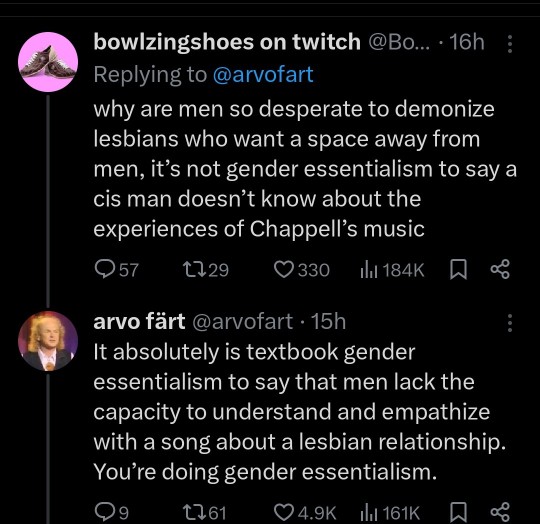
#and before you jump me#they were like but isnt this bigotry 2.0? 🥺#and like yes it is bigotry but not in the way youre implying lol#in any case if youre self described as 'straight' (straight not as in heterosexual but as in Not Queer)#this is a conversation that does not involve you and you need to walk right along#these type of discussions in marginalized groups open the gates for people who hold privilege over them#to get into it and start excercising microagressive shit#please apply the stay in your lane factor to the equation
68K notes
·
View notes
Note
Its pathetic how you're trans exclusionary and also bisexual & agender. Do you think that if transphobia continues they're not coming for you next? You think you're safe from being called a freak or a pedophile or from being accused of invading other people's spaces? From legislation and the dominant social paradigm othering you and making your life hell? You think throwing others under the bus will save you? You're a fucking coward and I hope you get a sense of reality.
i totally forgot that you even sent this ask because guilt-tripping from random strangers really doesn’t faze me — sorry!
anyways, umm, it’s pathetic how you’re sending random feminists hate mail over something that is literally not even true! i fully include trans and nonbinary people within my feminism — just not transwomen and nonbinary males because i believe female people of any gender still face challenges, discrimination, and oppression directly related to the sex we were born as!
…which wait, before you tell me intersex people exist, i know that! but intersex disorders are medically sex-specific and binary, and in the extremely rare case that a chromosomal male was born and grew up with entirely female external genitalia (usually as a result of Sweyer syndrome), i’m fully open to nuance when it comes to their inclusion within the radical feminist movement, especially given that the trans/qu**r movement has repeatedly ignored the requests of both individual intersex people and intersex organizations to stop equating the trans and intersex experience. it’s not like they can turn to you guys for any actual understanding or compassion.
in my LGB advocacy, trans people are also not excluded based on their gender identity! the only people excluded from my LGB advocacy are heterosexuals — which yes, i’m sorry, i do live in the real world where sexuality is based on actual physical sex, so yeah… “transbians” and “gay transmascs” are generally excluded (those open to or exclusively T4T aside) on the basis that they do not experience same sex attraction. but if you’re not straight, congratulations! my LGB advocacy is also for you.
the “agender woman” in my bio is also mostly a joke, “agender” more as in “atheist” — i do not subscribe to the belief system of gender. although, if i did, that’s probably still how i would describe myself because even if i thought that innate gender identity was a thing for other people, i don’t have one. i don’t identify with femininity. i do identify with my lived experience of being female. idk how else i would explain that in your community without being scalped, lol. and it’s poking a little bit of fun at my teenage self for actually genuinely telling the more micro-label oriented of my peers that the best i could describe myself was as a “demibisexual agender girl”.
if anything, though, the people standing in my way of being freely truly agender and living as a woman are BOTH conservatives and the trans/qu**r movement, because i really don’t want to have to have an ideological argument with either of you about what the fuck my leg hair means, i don’t want to be assigned a non-woman for having body hair and not being extremely feminine by EITHER of you! you are both supporting a dominant social paradigm which others me and women like me, it’s only the way in which you shame me and make me feel like a freak that differs.
i’m fully aware how the American political parties have lumped very separate issues into the same bills and are practicing other nefarious political schemes to remove womens’, childrens’, and LBG peoples’ rights by using the decrease in public support of the trans/qu**r movement to pass bills and laws that otherwise wouldn’t be passed… because y’all keep supporting fucking pedophiles? maybe stop doing that or if you personally aren’t, tell your buddies that trans people can be horrific criminals, just like any other subset of people, because all individuals are different, and murderers and rapists and pedophiles don’t deserve public support even if they’re trans. the fact that the most vocal of the trans community keep defending and supporting convincted pedophiles, rapists, and other dangerous violent criminals simply on the basis that they are trans is a large part of WHY many of us “cis” LGB people are publicly separating ourselves from the TQ+, we know how bad that shit looks and have historically condemned the members of our own communities who have been revealed to be pedophiles and rapists. not to mention the fact that the heterosexual TQs are like, wildly homophobic.
pretending outright that trans people cannot be violent criminals is something that can and rightfully should be criticized — i would criticize the assertion that any protected minority class status makes a person immune to any sort of violent criminology, or otherwise not deserving of facing consequences for committing violent crime, especially sexual violence against children, including the minority classes i belong to. i’m certainly not against trans people recieving proper legal defense, and i believe trans people deserve the same presumption of innocence as anyone else until proven guilty in a court of law… and while i do not believe males belong in female prisons (as inmates OR staff, tbh), i do believe that prisons in general are in desperate need of reform and that that reform should be considerate of the needs of vulnerable male populations such as transwomen and gay men for safety from other men while also maintaining female-only prisons.
i don’t know what you expect me, a poor & disabled woman living in a northern democrat-controlled state, to do about the shady shit happening in Florida and elsewhere in the American south. i’m not even in a position to vote on anything that could be considered “throwing other people under the bus”. the biggest things i’ve voted for were keeping the state democratic, legalizing weed, and protecting the right to abortion. i’m sooo politically evil and throwing so many people under the bus and totally perpetuating a genocide… which i guess if you’re a conservative you could say about the fetuses, but, since you’re barking up my tree for siding with conservatives, i’m hoping that you’re at least fucking pro-choice.
I’m not trying to be mean here, but you kinda came up in my inbox being mean first… so frankly I think you’re the coward for not thinking independently and for needing to harass women who do, and I hope YOU gain some sense of reality, as well as empathy and nuance.
#r#asks#tra hatemail#like… dude i really don’t want personal beef with you#i am genuinely sorry for having to get a little harsh… but you came at me with that energy first#if you have any questions or would like to discuss anything i’ve said further i’m fully open to that#however i’d far prefer the tenor of the conversation to be respectful
5 notes
·
View notes
Text
(in the last paragraph I briefly mention emotional abuse and some of the things it made me feel, but nothing graphic. just putting it here in case you don't want to see that at all.)
you know how a common aro/ace experience is feeling extremely alien and broken until you find out you're aro/ace and now you feel better about yourself since there are words to describe your experience? I had the opposite experience. I thought I was a perfectly normal, straight kid who just didn't want to date prematurely. I even thought I had a crush on more guys than I care to count and that I fall in love easily! and only when I realised that I'm more aro-ace than anything did I think that I'm broken as hell, specifically because I realised I'm aspec. I don't really feel that way anymore but it's interesting that I had an experience that (at least to me) feels extremely unpopular.
it's also interesting that as an older kid I basically viewed myself as hyperromantic, because now I look back at my experience with romance and crushes and such, armed with my older self's knowledge and honestly, in retrospect it's so obvious I was aro even as a kid.
1. I'm pretty sure I experienced alterous attraction at some point (kind of in between romantic and platonic attraction) because with most of my "crushes" we stayed friends (or even had no actual relationship of any kind develop) and as far as I remember I was not at all distressed by this. I was more distressed about witnessing them having good relationships with others, because I've been graciously spared from those many times. to this day I'm extremely jealous of naturally likeable people who effortlessly have multiple good relationships.
2. apparently you can hyperfixate on people as well. as someone who suspects they're auDHD it makes a lot of sense that my "crushes" were less about an actual desire to date and be intimate with someone, and more about "hey this cool new person just stepped into my life. they will now consume all my thoughts". of course a lot of my thoughts were vaguely romantic in nature, because, well, I was a straight girl and what else would you think about when it comes to a cute boy? (there's also something hilarious about looking back at myself from a decade ago and my tween self thinking they're a 100% heterosexual cis girl.)
3. I was also not particularly bothered by being rejected. a supposed crush rejected me back in the day and not only did I not feel sad, it's like I forgot I ever had a "crush" on him. it was basically just an "oh well" moment and I moved on with my day.
4. I did think a fair amount about doing different romantic things but I put absolutely no effort into getting to know people romantically or making those daydreams a reality. when I chose to get to know someone better, it wasn't ever with a clear romantic intent. my desire for romance was very passive (and sex as well, I either didn't imagine most of these people in a sexual light at all, or a friend who knew about my "crush" did the work for me, and only then did I think the same things. my object of romantic and sexual thoughts was often more of a hypothetical unknown someone than an actual person I knew).
5. I had extremely bogus criteria for what makes a random guy a crush. cute? crush. I befriend them and think of them a lot and feel like talking to them? undeniable romantic attraction. I think teen me was just extremely starved of positive attention (most people wouldn't even notice me usually, and my tween/early teen years were the starting point for most of the abuse i went through) and possibly realised early on that as a girl, the only way you should be feeling towards guys was the romantic way. I am not immune to amatonormativity. anyway, in retrospect I did internalise a lot of things without ever thinking my experiences aren't normal or healthy. just like the way I thought your body's responses to emotional abuse (like intense self-hatred, inexplicable guilt, passive suicidal ideation) are a completely normal part of the human experience (because why would your mother, who loves you, wants the best for you, and provides you every material good you could imagine, also abuse you), I thought hypothetically wanting romance but refusing to put in the effort to make it happen was also perfectly normal and how most people operate. I had no reason to think of these things differently until life cruelly opened my eyes to the fact that I'm functionally extremely different from the norm.
6. since I'm probably neurodivergent and my natural state of being is extremely awkward, weird and not too likeable, all these "crushes" could've also been just an elaborate, subconscious attempt to fit in with the rest. just because I regarded my own lived experience as normal, doesn't mean I haven't been unknowingly fed information on what I should be instead of my true self.
tl;dr: as a kid I thought I was a completely normal person until life told me that I'm just about the furthest thing away from "normal", for multiple reasons.
#the alien's original thoughts™#arospec#aromantic#the alien's aromantic experience™#I wonder if anyone can relate to my experiences
0 notes
Text
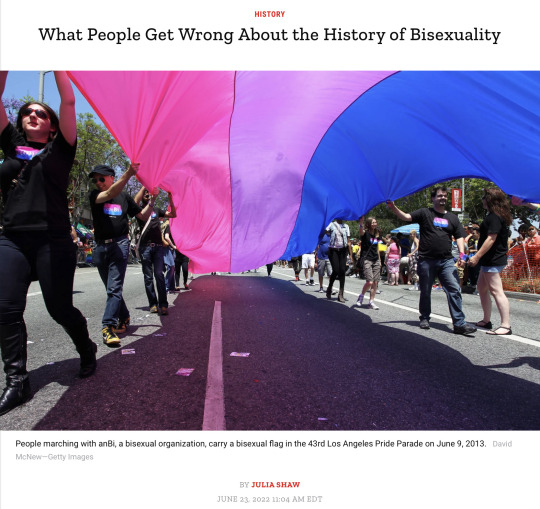
Collective amnesia makes us feel as if there are no bi people in history. That is, until we see that bi people have been there all along, they’ve just been mislabeled or left out of the narrative. Bisexuality is the sexual and/or romantic attraction to multiple genders. Nestled within the term bisexual are other labels, including pansexual, omnisexual, and polysexual. Which term people use is almost entirely down to preference, although sometimes the choice is driven by an ahistorical misconception that the bi in bisexual reinforces a gender binary and excludes trans and nonbinary people.
One reason why we might “forget” bisexuals is because those who are attracted to people of multiple genders rarely call themselves bi. Historically, there have been a number of reasons for this, including wanting to avoid discrimination and stigma. There have long been toxic misconceptions of bisexual people as promiscuous and unfaithful, in a confused state of sexual transition or experimentation, lying about their attractions for attention or to attract men (particularly bi women), or simply adhering to some sort of trend (particularly young people).
Being bi could also get you kicked out of your local queer space. Bisexuality introduces nuance, which has always made it easier to discard than accommodate it. In tough times, when queer people were fighting for their lives and for basic legal protections, some gay rights groups strategically rejected bisexual people. For example, in the 1970s there were instances where the Gay Liberation Front, a queer-rights group, treated bisexual people as effectively straight, and thus associated them with regressive politics and edged them out of the organization.
But historians have never let a lack of self-labeling prevent them from trying to find queer people in history. People also shied away from terms like gay or lesbian, and yet we can find many books on their history. Still, it was only when I went back to university for a master’s in queer history that I realized that the absence of bisexuality in most versions of LGBTQ+ history wasn’t because there were no bi people in the past. Rather, that lack of knowledge is the result of an overcompensation for compulsory heterosexuality, which has meant that most people with homosexual desires in the U.S. were forced to live lives that involved heterosexual sex and relationships.
In the search for queer lives in the past, one way that academics have dealt with this is to assume that people who had any kind of same-sex desires or sex must have been gay or lesbian, even if they were also in heterosexual relationships. Partly because of this, the term bisexual is often entirely absent from historians’ writings. By doing so, we are systematically mislabeling people who were attracted to multiple genders, erasing bi history. When we untether bisexual people from their own past, we obscure the ways in which bisexuality is a cornerstone of the human experience.
Here are some important people in bi history you should know:
The bisexuality researchers you need to know
One of the earliest researchers to legitimize the study of bisexual people was Havelock Ellis (1859-1939). Ellis was based in the U.K., and in the 1927 edition of his book Sexual Inversion, he describes many case studies of bisexual people. He includes some negative stereotypes, but also some decidedly positive ones. For example, he wrote that bi women made “great religious and moral leaders.” It is these kinds of positive statements that led to the first edition of his book being ruled “obscene” in an English court because he dared to write about queer lives without condemning them. It took him multiple attempts to get the book published.
Probably the most famous sex researcher of all time was Alfred Kinsey (1894-1956). He was a biologist at Indiana University who introduced nuance into the discussion of sexuality. His Kinsey Scale allows us to categorize sexuality as a number between 0 and 6, from exclusively heterosexual to exclusively homosexual. In his famous mid-20th century studies, he shocked the world when he found that a huge number of people (he often stated “a quarter to half”) had homosexual and heterosexual desires. He also openly criticized other researchers who assumed that people could only be either gay or straight, and spoke of the “endless intergradations” that captured the reality of people’s sexualities.
Following in Kinsey’s footsteps, Fritz Klein (1932-2006) was a sex researcher and psychiatrist who published the book, The Bisexual Option, in 1978. He was a bisexual man himself, and he started a group for bisexual men to help them feel secure in their own sexuality; that practice grew into affirmative therapy that would help many people better understand their own sexual behaviors and identity. The Klein Sexual Orientation Grid is an expanded version of the Kinsey Scale. Klein also set up the Journal of Bisexuality and the American Institute of Bisexuality, which both continue to further bi research today. These organizations have been fundamental in giving a home to research and writing on bisexuality.
Bi activists who fought for queer rights
There have also been a number of tireless activists who have fought for queer and bisexual rights, including Brenda Howard (1946-2005). Howard is sometimes referred to as the “mother of pride” because after the Stonewall uprising, she played a major role in organizing the first marches of LGBT+ people, which laid the foundations for global Pride marches.
Another activist who worked in some of the same groups as Howard, and continues their work today, is Lani Ka’ahumanu (born in 1943). Ka’ahumanu has been a leader of the bisexual rights movement in the U.S. since 1980. She founded a number of groups that were specifically for bisexual people, which was particularly important given the shaky history between bi people and gay and lesbian communities. Ka’ahumanu created safe political spaces where bi people didn’t need to justify their sexuality or their inclusion. To this effect, in 1983, she co-founded BiPOL, one of the first bisexual political action groups in the country; she later co-coordinated the San Francisco Bay Area Bisexual Network. Ka’ahumanu is also a major reason why the B is included in LGBT, because of her campaigning in the leadup to the 1993 March on Washington.
Other people who are still fighting for bi visibility and protections today include activist Robyn Ochs, who wrote the most widely cited definition of bisexuality; New York Times columnist Charles Blow, who fights for bi visibility including in the Black community; and Kyrsten Sinema, who was the first openly bisexual person elected to Congress in 2012.
The main thing that people get wrong about the history of bisexuality is assuming that there is none. As more people embrace bisexual identities, I expect there will be a new thirst for knowledge, followed by a quenching wave of bisexual stories uncovered from the archives of history.
By uncovering previously untold accounts, and re-telling the stories of people previously too eagerly labeled gay and lesbian, bisexual people will finally be able to remember some of the pieces of their own history.
Dr. Julia Shaw is a criminal psychologist at University College London and part of Queer Politics at Princeton University which works for LGBT+ equality, democracy, and civil rights. She is actively involved in bisexual research and is the founder of the international Bisexual Research Group. Shaw’s latest book, Bi: The Hidden Culture, History, and Science of Bisexuality, is set to be released on June 28.
#bisexuality#bisexual community#lgbtq community#lgbtq#bi#support bisexuality#lgbtq pride#bisexuality is valid#pride#bi tumblr#bisexual#bi pride#bisexual nation#bisexual pride#bisexual education#bisexual youth#support bisexual people#bisexual men#respect bisexual people#bisexual rights#bisexual history
47 notes
·
View notes
Text
Lesbians and Bi women have differing and specific experiences- this is indisputable and needs to be respected. However, some women use this fact as a shield to be grossly misogynistic and biphobic. One of the best examples is this weird obsession with bi women and whether or not they are attracted to or will date a man at some point. God I've seen so many fucking posts with lesbians crying about this shit and talking about how valid they are for the resulting distrust and/or disgust in bi women in general for an experience they had or-OR SOMETIMES LITERALLY DIDN'T HAVE.
Here's a funfact: I'm a bisexual woman and i've felt the misery and rage they describe towards other bi women for "choosing" men/boys over me. It's terrible, it's all consuming, and most of all, it's completely pathetic. Now, that's not to say it isn't understandable to feel that way, but it's another thing entirely to take those feelings and decide that it's the other woman's fault (or in this case, all bisexual women LOL). It's definitely easier for me as a bisexual to look over those feelings and figure out that they are unfair and unreasonable for me to have, it's definitely easier for me as someone who not only has, but listens to and values, female bi friends to know my insecurities are not truly founded, but come from the fact that we grow up in a heterosexist society that only shows opposite sex relationships as an option and stresses to women and girls how a man is the best and most important thing you can have in your life. But just because it might be easier for me to sort through those emotions, doesn't mean it's not terrible, and it certainly doesn't mean that lesbians shouldn't be expected to figure their shit out instead of taking it out on bi women.
I've seen other bi women chime into these conversations like "this has happened to me, it sucks" only to be very swiftly struck down with "this is not something you as a bisexual can understand." (Usually said with more scorn and mocking) It's almost funny to be honest, the way some bi women on here try time and time again to be "good bis" just to keep getting shit on. How do these lesbians know how bisexual women feel? It seems we are constantly told we have no idea how they feel, and i'd have to agree that i have no way of guessing what it's like to be a lesbian, the same way they have no idea what it's like to be me. I can however, read the feelings they describe and recognize those very feelings inside of me, the ones that i know are wrong and come from a place of self-loathing. I can know that because i feel such strong attraction and chemistry to women, i only want to be with them, so any reasoning of "well bisexuals cannot understand because they can ChOoSE a 'het' relationship and access all heterosexual privileges, so no they don't understand how this really feels" just shows how little they understand bisexuals and obviously biphobia. No bisexual can access all het privileges because we are fucking bisexual. It doesn't matter how repressed or closeted we are because those themselves are not heterosexual privileges (just one example). And i know damn well that I won't have any of those privileges because i cannot be with a man, i can't do it. There are many times i wish i were capable of it, but i just don't see it as a possibility.
All this to say, I'm really fucking tired of this shit. I'm tired of having my own feelings and experiences explained to me. I'm tired of supposed feminists exposing their own blatant hypocrisy again and again and everyone applauds it. I am so tired of these straight women on radblr who think it's okay to be biphobic. i'm just so tired of all this shit.
"log off" maybe. but it happens irl too, all the time, at least on here i can see what other bi feminists are thinking and take comfort in that.
#big#rant#my thoughts#i've been thinking about this a lot#bc it's like#'it's okay for lesbians to feel this way towards bi women because *insert some of the most biphobic and creepy shit i've ever seen'#literally what the fuck#I dont think it's right to judge these women for their insecurities#obv i dont lol#but loudly and proudly proclaiming this shit like it's justified...#that IS some incel shit#bisexy tag
47 notes
·
View notes
Note
Okay i saw your post about secret terf readers and i am one. So i have a question. Is there any room for asexuals on the radfem community? I feel like from the actual theory we could talk about how marriage is oppressive, cultural constructions of what it means to be human, the shaming of single women, etc., but every radfem blog i find only ever wants to make fun of aces for being virgins or whatever. I really peaked after reading abt the cotton ceiling, being pressured to alter sexuality 4 men
This ask is pretty old. tw for discussion of sexual violence below.
yes, sure I think there is space for asexuals in radfem community. However…I do believe that true asexuality in humans is extremely rare. That being said, if what you’re experiencing (due to fear, preference, trauma, conditioning, whatever…) is what you’re willing to call asexuality, then it might as well be, right? If women are choosing a celibate life and believe it’s coming from an innate part of themselves, I have doubts but I don’t really want to argue about it with them. What good would that do for me or that woman? I think it’s normal, fine, perhaps even healthier in some circumstances to not have sex. No one needs to have sex, no one “should” have sex.
I do think the jokes about asexual people come from a place of concern for the entitlement a) apparently straight and b) self-admitting sex havers possess to be included in the lgbt, the “queer” community, under the “gay umbrella”, especially with how much homophobia is slung around in these conversations. Many people on tumblr/twitter will say they are “ace” but admit to have a heterosexual relationship where they are having frequent sex, and then claim either specifically or through implication that gay people oppress them by not “allowing” (how? in what way?) them to discuss their “queer experiences” of being…in danger somehow? The “danger” the ace community will discuss is often just copied pasted list of homophobic dangers gay and bi people experience, with no sources. It seems like straight fetishization of homophobic violence - ace people are not being denied homes and jobs and are not being beat up.
I will say the idea that women are “correctively raped” to “fix her” of her lack of interest in sex has some merit, I just wish they wouldn’t use that language. Especially since that idea of raping women to “unlock” her sexuality is just standard age old misogyny that all women are at risk of, not just women who want to be celibate. It’s important that standard terms and words we use to mean specific things don’t get muddied up by expanding the definition until the words are useless. Corrective rape is used to describe a specific homophobic violence, there’s no need to co-opt this very touchy and potentially triggering subject. Its also not, as I outlined above, an “ace” issue as much as a woman’s issue: a woman’s desire to be non-sexual will often not be respected due to the patriarchal idea that a woman doesn’t own her sexuality, men do. Women are not “allowed” to make this choice, they are receptacles for male sexual gratification.
in any case, to answer the question, yes all women should be welcomed to explore radical feminism, and other forms of feminism. BUT! All women should be expected to have their beliefs challenged in the processed, and have what they hold as objective truth questioned. I also could discuss more about what exactly is a “radfem community”, where do they exist and how do they exist, vs radfem tumblr. I don’t think I’ll expand on that here at this time, but I would argue the abbreviation “radfem” and how it’s used online has ostensively taken on a new meaning than just “radical feminist.” there IS a radfem community on tumblr, but is it radical feminist? is it feminist? is it well defined? how does it function? my main takeaway for this particular point is that feeling ostracized from “radfem tumblr” shouldn’t fully color your experiences as a woman exploring feminism. enjoy exploring! :)
154 notes
·
View notes
Note
Hey Goldy, i'm positive Yoongi isn't straight and has been fairly open about it from the early years. So do u think that Yoongi could've influenced Jikook (especially Jimin cuz he is very close to him) in any sort of way on their journey?
Jimin is VERY close to Yoongi
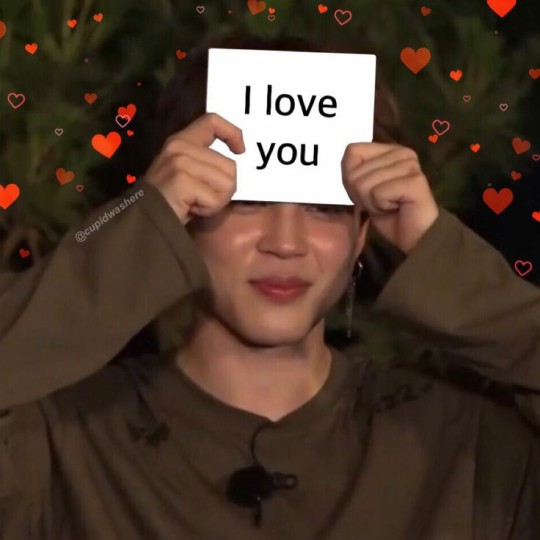
Thank you so much for this statement😭
I feel seen and heard🤧
Not a lot of Jokers out here appreciate Yoonmin's bond😭😭😭😭
The disrespect! How dare they!
In reality, Yoonmin is one of the best ships that reflects the hyung dongsaeng dynamic perfectly in BTS in my opinion- Jinkook and Yoonkook, NamTae are heavy contenders I'd say but Yoonmin is right up there with them. Love Jihope too- if they could cut down on the flirting chilee.
No JHOPE I don't want you to call Jimin sexy or look at him like you want to gobble him with a glass of Sprite- it's weird😭😭😭
But also don't stop
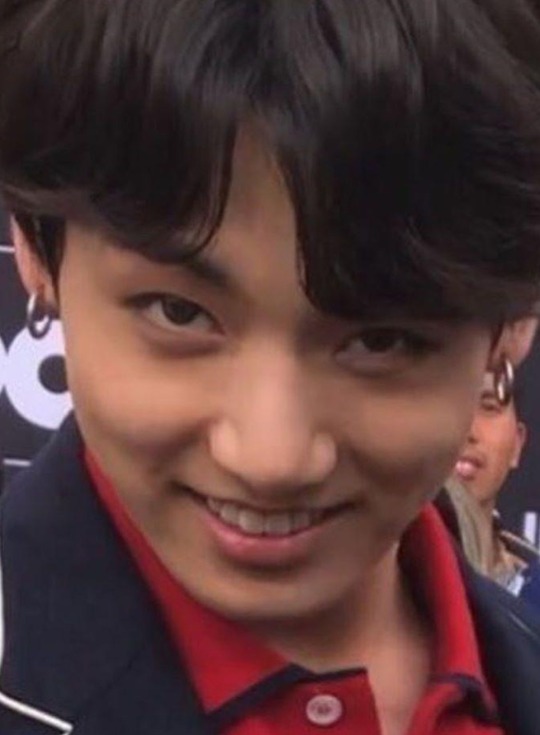
From Suga 'bullying' Jimin, teasing him, praising him, mentoring him, the bickering- he is the biggest PJM right next to JK and Namjoon. I said what I said.
So thank you for this. I literally cried.
Feel so good to hear someone say that.
I'm having an existential crisis at the moment and Yoonmin is what is getting me through it at the moment.
People need to stop invalidating the members' bond. Seriously. Not cool. They all have beautiful dynamics real or not.
But he's gay? 🤔
You believe Suga is gay??
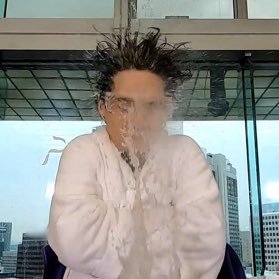
Damn.
He's queer and has been pretty open about it from the beginning???
A lot of people assume that about him actually. I think it's interesting.
Did he influence Jikook, Jimin in anyway...
If by influence you mean support then yes. I think he was and has been very supportive of Jimin and JK individually and has helped them embrace and make sense of certain aspects of themselves.
I think he's more understanding than most of the challenges and difficulties of being young and uncertain of who you are growing up under public scrutiny and in a highly hostile environment.
I think he is wise beyond his age and I have a ton of love and respect for him as both a person and an artist.
I love 'People' so much...
I think the most Iconic thing he's said so far to me is this totally woke, fanservice questioning and ridiculing statement:
'I didn't want to wear the maid outfit. I was surprised when they said it's for the fans. We don't have any interest in seeing girls wear men's clothes so why does the fans want us to wear women's clothes?'
It's weird. Fanservice is weird.
My least favorite moment of his is when he admonished JK not to say things like he'd want a tattoo when he grows up because the fans wouldn't like that.
I found that very contradictory for someone who's life motto is nevermind- or is it I don't give a shit?😏
Find it equally triggering whenever he teases JK about crying too much or being a cry baby as if it's wrong for men to cry. There's nothing wrong with shedding tears. Men cry too.
Then the bit about him not wanting tattoos or just a dot on his toe or feet or something because he has things he might want to do post BTS that having a tattoo would just be an inconvenience... quite conservative I'd say.
He don't give a fuck but then he gives a fuck?
Mans gotta be a realist or I'd chalk up these inconsistencies in his values to the clash between his Persona and his real self.
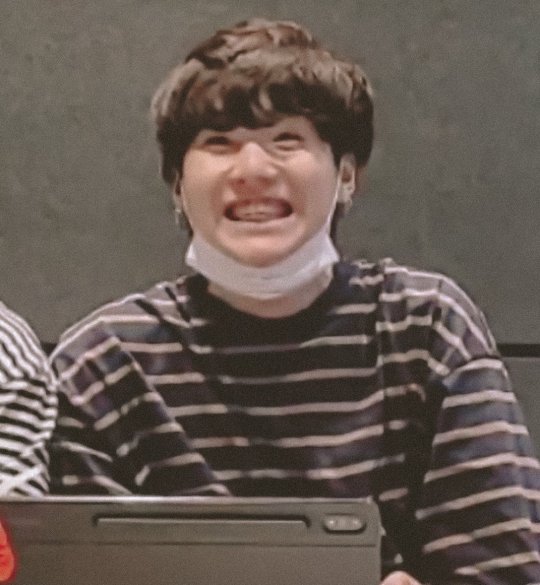
To be fair, he's not the only one. That conflict plays out in almost every member's outlook.
I see Yoongi as that one person who'd say to a person, go for it but end that advice with a caveat such as, 'but understand people will hate you for it' or some truth along those lies.
He places consequences right next to desire and as long as the person is not oblivious to and can bare the consequences of their actions, decisions and choices then I think he'd ask them to go for it and stand in their truth.
That much I know is his value and I can see how that might have impacted both JM and JK. But rather than encourage them to take risks, I think he pushes them to seize opportunities and put themselves outside- there's a difference there. Their not one and the same.
More than anyone in BTS, I think he understands the gravity of being queer, closeted or being in a relationship with a bandmate in the industry they work in.
I think he is much mature enough to understand the consequences of over attachment and risks of detachment and that too plays out in the way Jikook carry themselves around in the group.
Other than that, I think he minds his business most times.
Do I think he is open minded about conversations on sexuality? Absolutely.
But that's as far as I can go on the topic.
I do not believe he is queer and I'm not convinced in anyway he is pansexual or bisexual either- don't quote his song lyrics to me I already know. Lol.
Boy or girl my tongue will send you to hongkong....
And then his interviews about what he finds attractive in women??
'... it's not limited to boys or girls?'
Lolololololololol
I think that bit was heavily misconstrued.
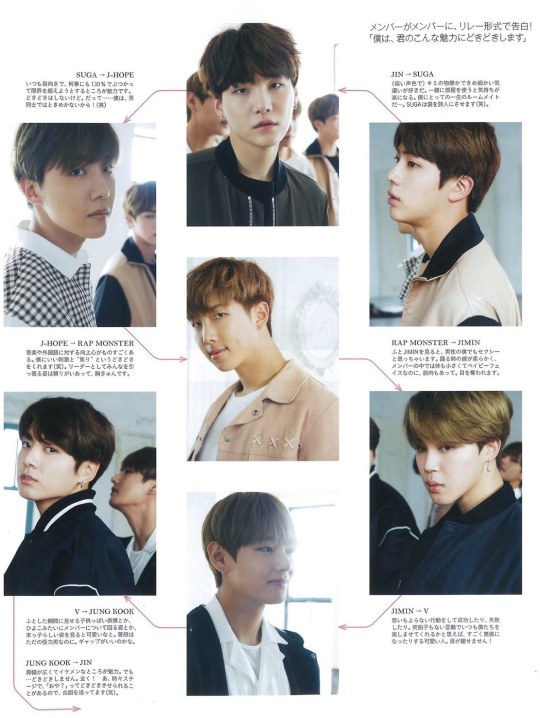
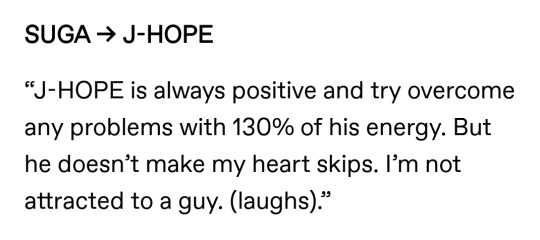
'I'M NOT GAY'
This was his response when he was asked to talk about moments his heart skipped because of JHOPE. Similar to moments when the members had said their they almost fell for a band mate perhaps.
Other translations of that statement he made in the interview was, 'since we are both men, how can my heart throb for a man' and then he laughs it off.
Knowing Suga, I think he probably meant that in the most ridiculing, most mocking way possible- these interviewers be asking some stupid questions sometimes.
But imagine Suga saying that with two gay members sitting right next to him in that interview and how these members would feel hearing him say that about homosexuality.
One thing about BTS, if they be making loud openly 'woke' statements, take a shovel to their past- it's usually because they've messed up somewhere and are simply acting conscious of the things they say that can come across as problematic. In my opinion.
They do learn and grow from their mistakes. That's one thing I love about BTS.
They've all had their problematic moments as I keep saying.
To me, this interview moment would be one of such said problematic moments if not one very homophobic moment of Suga's- if the translations were right I mean. chileee. Lemme shut up. Lol.
And before anyone says but JK said the same thing too...
JK had a 'fear' of coming across as Gay in his early years. Part of the reason he wanted JM on the west of his east when the cameras came around- in my opinion.
He'd stutter when similar 'gay' questions were thrown his way- prompting Jimin to ask him straight away not to answer said question when an interviewer asked him.
You pair that with some of the members describing him as 'wanting to be manly' or appear like a manly man and it's not hard to figure out what was going on with him.
He'd pause and look at JM funny when JM would describe their relationship as in between friends and romance...
Jimin had to tell him to relax and that it was normal for men to say 'love' to men without it being weird or gay.
He knew gayism was a thing. He simply didn't want to be viewed as one- either because of his own repressed homosexual desires, in which case that would be internalized homophobia or he really really didn't like being thought of as gay- homophobia.
Suga's is different.
He either genuinely didn't know gay was a thing or that some men's heart actually beat for other men- seems to me he thought the idea of a man's heart skipping for another man absurd or impossible- or dude thought he was being a smart pants with that remark. Lol.
Baring his age in mind at the time of the interview, that in anyway reflects his ideals or assumptions about sexuality. That heterosexuality is D norm. That straight is all he can be or should be thought of as- He clearly hasn't read the blogs. He's in for a rude awakening.
If JK had this ideology about sexuality I think he would have been able to hide his sexuality better and not freak out each time people made jokes about it💀
Suga's said explicitly he is attracted to gal's who wear headphones, doesn't like gals who play hard to get- said he'd kick em if they didn't quit playing hard to get (misogynistic and abusive lyrics there but it's hiphop- let's not talk about that) finds it ridiculous that men should wear female clothes, thinks 'men' shouldn't cry.... all the making of a fine gay man😃
Should we chalk it up to internalized homophobia then??
I wouldn't.
A very dedicated Sope shipper will tell you, he said what he said to cover the fact he is gay so there's that. Lol.
I'm just not convinced Suga is part of the community but I think he is open minded now, leans less into his conservative values and more towards progressive values and thoughts.
I don't think he in any way shape or form 'influenced' Jikook to be gay or to do the gay if that's what you were asking.
But I do respect your opinion on Suga. I think we are all free to assume whatever we want in this case.
I might be wrong about him. You might be wrong about him or we could all be right. We will never know.
Thanks for the ask.
Wasn't comfortable answering it though. Lol.
I don't like when I have to watch what I say.
Sigh.
Signed,
GOLDY
63 notes
·
View notes
Text
my "Crowley isn't attracted to women" take
for @spnprideweek - day 2 - mlm
cw: dicussion of homophobia & transphobia all in all I wanted to highlight how canon gay Crowley is bc I love him 💕 thank u spn for Crowley even tho he deserved better
in the last weeks I've realized there's a huuge consensus in the fandom for pansexual Crowley. if you're pan or not and wanna hc Crowley as pan, power to you! but what's bothering me is the non-discussion of it all. the way it seems obvious for everyone. whereas, to me, Crowley has been canonically gay all this time.....
disclaimer: I'm aware Mark Sheppard alledgely said he saw Crowley as pansexual, however I can't even take these words for canon without context. Especially not when a year later he'd say Crowley's sexuality didn't matter. The way Mark Sheppard talks about characters' sexuality is more a "why are people making a big deal let them be" than "the character doesn't care." Moreover, actors pov can't be taken as canon imo. Jensen Ackles thought Dean straight for so long when Dean's been bi all this time as well. Sometimes actors are biased by their own experiences & stereotypes!
disclaimer #2: on god I don't wanna start discourse lmao. I just wanna share my silly thoughts about a tv show & question the way Crowley's sexuality is written in this silly homophobic tv show. don't @ me about what's making you think Crowley is indisputably pansexual bc I assure you I already know your points
That being said, here's why I think Crowley is a bear, a gay man, a trans gay man actually, a homosexual, who isn't attracted to women & some food for thoughts about why the unquestioned consensus towards pan Crowley could have roots in both homophobia & panphobia.
I don't think we can think of Crowley as your usual demon. We know too much about Crowley's life as a human, and the numerous ways in which he acts un-demony, almost humanly after. Considering him simply like a demon with no concept of gender preference who would be pan “by default” wouldn’t be right with his character. But we also can't question his sexuality in the exact same way we would a human's.
It also can't be thought in the same way as angels': as once-humans demons do have a concept of gender. Crowley especially cares a lot about his gender presentation and the way he's addressed. Not only does he literally sell his soul for a bigger d*ck as a human ; as a demon he uses the same vessel where other demons are shown to move once they had to leave one ; and for the few hours Crowley's possessing a woman, he clearly states he should still be referred to as king.
This will all be used for homophobic & transphobic jokes in the show, but I'll get back to that later on. Gender does matter to Crowley's identity, and I think it could be extended to his sexuality.
I've seen numerous descriptions of it all saying Crowley's sexuality was "ambiguous" and I guess it is, as he never explicitly used any label. However "ambiguous" doesn't mean bi or pan. It doesn't mean anything besides the fact we can't draw a clear-cut conclusion of his sexuality.
Imo we can actually draw a clear-cut conclusion of Crowley's sexuality but yeh, I'm getting there.
----------------
Let's take a look at canon events around Crowley & sexuality!
His character introduction is him enjoying making a homophobe man kiss him for a deal
It is rumoured that he was a demon's lover (Lilith's)
He heavily flirts with Bobby
He french kisses Bobby for a deal and takes a pic
He never kisses a woman on screen (tell me if I forgot anyone!)
He flirts with every single man he sees, and even more strongly when it's making the other uncomfortable
The other parent of Crowley's son is never mentioned nor even brought up
He has two orgies that we know of
He has sex with a demon who's possessing a woman (Lola) when he was addicted to human blood
He dates, has sex with, and asks Dean to rule Hell with him. He's in love with Dean
On late spn he drinks fruity drinks
He flirts with and implies he had sex with an angel (Naomi)
He flirts with Death (Billie)
He's into BDSM
I'm not gonna go into details with all the sexual stuff he says bc there's a lot.... But it's always about gay sex. (once again, if I'm forgetting smth pls tell me nicely)
Now, with all that I'd like to question specifically the elements people use to say Crowley is canonically attracted to women.
He has two orgies that we know of
There’s the one Crowley has while he’s himself possessing a woman ; iirc it’s a foursome with two other men and one woman. Crowley still counts as a King, as the show makes sure we know, admitedly this dialogue implies we should still think of him as a not-very-manly-man.
Honestly, if one is convinced Crowley is attracted to women based on this scene.. okay. Personally I don’t see it because the orgy is unplanned, it’s an opportunity Crowley takes. Is he even attracted to the two other men?? Who knows. We don’t even know if Crowley even touches the other woman, there’re so many ways to have group sex. Even if he did, having sex with one woman doesn’t make it impossible for him to be homosexual.
The second orgy is with Dean. Crowley describes it then: “We've done extraordinary things to triplets.” It’s interesting how before I went to check, I thought it was clear the triplets were women. But not at all! I’ve been tricked by heteronormativity myself. So this is up to interpretation. Even though the way the show doesn’t make sure we know the triplets were women is pretty telling (as I’ll talk about later).
It is rumoured that he was Lilith's lover
Well, this is a rumour. In this relationship Crowley would know Lilith as a demon possessing a woman, and Lilith would know Crowley as a demon possessing a man as well. Who's even to say they met in their vessels to sleep together. That's the kind of cases in which the ambiguity of Crowley human/demon situation makes it impossible to draw any kind of conclusion towards Crowley's attraction to women. Also if anything Lilith is clearly a lesbian lmao.
He has sex with Lola when he was addicted to human blood
Same thing here, the relationship is one of demon/demon. Though we do now they do meet in their vessels to sleep together. Besides that, the sex happens while Crowley is at a low point. She's the one bringing him human blood, which makes the sex more of a transaction than anything. It does fit a very grey area of consent which would be fair to question.
We can't know for sure whether the demon possessing the woman was a woman as well, but let's say she was: 1/ Crowley having sex once or twice with a woman doesn't prevent him from being homosexual. 2/ What is he seeing if not a demon's true form? 3/ Wasn't he in a self-destructive mental state?
It's a stretch, imo, to assume Crowley was attracted to her.
He flirts with and had sex with Naomi / flirts with Billie
This one is so ridiculous to me bc Naomi is an angel and as a demon, Crowley sees her true form. We don't even know who was her vessel when they had sex.
The flirt thing is interesting however, bc iirc Naomi and Billie are the only "women" we see Crowley actually flirt with. During the orgies or the demon sex there's no flirt involved. It's interesting bc, as Cas would say: "Naomi's vessel is a woman. Naomi is an angel."
Same case for Billie who's a reaper then Death. Spn is pretty unclear about how the whole thing works but we know reapers are kind of angels. In any case, I won't go as far as saying Billie has any connection to gender.
Moreover, the way Crowley flirts with them is pretty light next to everything else Crowley says to men. It's pretty personal, I'm aware, but I do relate a lot with the way Crowley flirts with them VS how I flirt with men just because (and I'm a lesbian).
Anyway! Both Naomi and Billie are supernatural creatures, which brings the count of women Crowley flirts with to... zero.
-> What I take from all that is that Crowley is attracted to men for sure ; to angels and demons ; and doesn't care about the genitalia involved in the sex he has. We have nothing about the kind of relationships he had as a human. His gender presentation matters a lot to him. The only long-term commitment he has is with Dean. I wouldn't even say he had a committed relationship with Gavin's other parent bc we don't know anything about them.
----------------
But what's my deal with homosexual Crowley? One can wonder, if Crowley doesn't care about bodies, doesn't that mean he can still be written as pan?
No! First because sexual attraction isn't about genitalia (even if transphobes would argue the contrary but they're transphobic so...). And second, well....
I would refer to this point as "how do I know Crowley isn't attracted to women? bc Dean is"
I'm convinced that if the show wanted to write Crowley as anything other than a gay man, it would have been way more obvious.
This is a show who wrote Dean catcalling a faceless woman on the street, for no other reason than to remind the viewers Dean was attracted to women & to balance it with the following homoerotic scene.
One could say spn doesn't have lots of women characters to begin with, but that's my point exactly: when spn wants to show attraction towards women, they do find women for people to be attracted to. Hell, they even give Gavin some girlfriend but never ever bring up the topic of Gavin's other parent. Even though an entire episode is dedicated to learning about Crowley's past.
What's important to understand Crowley's sexuality isn't the people he slept with ; it's the people he doesn't show interest in.
The absence of something is the presence of the thing, blablabla. It's a way to look at homosexuality that heteronormativity makes hard to see because, unconciously, we don't tend to question attraction towards the expected gender. One would ask for a 10 pages essay on why a character is gay, but one would need only a 2 sec kiss to assure a character's heterosexuality or attraction towards the expected gender.
----------------
In Crowley's case, his attraction to men is a huge part of his character right from the beginning (thanks god, at least no one's questioning that). Spn as a show that hears what the fans are saying and twists writing accordingly, is perfectly aware of that. Yet rather than pushing women at him along the course of the show to remind everyone how Not Gay Crowley is - the opposite happens.
Yeh, Lola, Naomi, Billie, they all happen in the later seasons. But even then, the show somehow can't write Crowley as attracted to a human woman.
What happens then is: not only does Crowley fall for Dean ; he engages in some BDSM play with Lucifer : and he switches from drinking only the finest Scotch to fruity cocktails.
The BDSM thing as well as the drink thing are choices rooted in stereotypes, that's how spn is! But it does canonize Crowley's homosexuality. They're depriving him of his "masculinity" as the show goes on, because they purposely write him as homosexual. I don't think spn would have ever written a bi or pan character that way.
We learned a few days ago that Crowley died in a gutter. He died in a gutter for a bigger d*ck. I'm just gonna refer to Oscar Wilde & Mika on this : "some of us in the gutter are looking up at the stars."
The "referred to as king" scene isn't about Crowley being a demon and so not caring about gender - it's the opposite. Other demons are the ones poiting out Crowley's vessel. This is a transphobic joke. It's the demon edition of the "gay boy in a dress" transmisogynistic trope.
Viewers aren't supposed to be on Crowley's side ; we're supposed to be giggling with the other demons while Crowley is being emasculated. Crowley gets a woman vessel because he's a not-very-manly-man, because he's a trans man, because he's homosexual.
And I know that bc Dean is written as bi, and all they're doing is reaffirming the way he does like women while being extra subtle with his love for men.
Meanwhile Crowley is losing influence and power, loses his authority as he loses his throne in Hell, gets humiliated by Lucifer, until all his character revolves around is his love for Dean. The way Crowley is then protrayed as some lovesick ex who can't move on is, imo, a straight man fantasy. Crowley's love is both used as predatory and as a tool to validate Dean's Peak Masculinity.
Spn has been burying their gays all along, and Crowley was right there being punished for not only being in love with Dean but for not being attracted to women. For never being able to be a "normal" guy. For never being able to be seen as a "normal" guy. For checking every homophobic stereotypes in the books. Crowley as a human dies because he's a trans man. Crowley as a demon dies because he's homosexual.
----------------
That's what leads me to be uncomfortable with the way the fandom seems to have a consensus towards pansexual Crowley. (Once again: idc about people's personal hc of Crowley as pan, I just want to think critically about the way no one thinks twice about it & accepts it as canon so easily. Hell, just bc I dared to ask what started the pan Crowley confirmation I got accused of erasing his pansexuality. All I did was ask a question.)
To me, it feels like erasing everything his character went through because he was gay. And it seems to be taken from a reasoning which is going to assume Crowley is attracted to women.
I mean: the reasoning would go "oh, Crowley clearly has a non-straight sexuality -> he's attracted to men -> he's pan" His attraction to women being accepted by default, without needing any backup. And when I look at the canon I see nothing implying he'd be attracted to women. Taking Crowley's attraction to women for granted is following an heteronormative thinking.
Being into people isn't all about who one sleeps with. It's about love. And when we look at what spn shows about Crowley's close relationships, the only meaningful one he got is with Dean. When Rowena wants payback for Crowley making her kill Oskar, she goes for his son.
And it's SO interesting to me because if angels can't be in love because they don't have a soul - can demons? as they're beings with a destroyed soul? And if so, how powerful of Crowley to still fall in love with Dean Winchester.... the power of gay love :) (Crowley 🤝 Cas)
----------------
To conclude all this with some more stuff to think about if, like me, you love questioning everything:
While it's not wrong per se to hc Crowley as pan, it can be worth questioning what's making us so sure we collectively just vibe with it? To me there's a few things: - As I was saying: heteronormative bias - Crowley being a non-fully-human character - Crowley being masculine (despite the show's attempts to erase that) - Crowley being into BDSM - Crowley flirting and making sexual remarks in every context
These, unconsciously, gives a vibe of a character who's "outside" of the gender norm, not making big deal of their sexuality, not even questioning it. This creates this idea of "ambiguity" around Crowley's sexuality. The way Crowley particularly seems to be really chill about sex, is a demon (so what does he know about gender?), and heavily flirty, ... is what most people will link to pansexuality. That doesn't mean thinking of Crowley as pan is being problematic™ ; this means in western medias that's what fills the "pansexual character" imagery (like basically: the Jack Harkness type).
However, when we look at it like that, none of these elements are defining of pansexuality. None of them are excluding him from homosexuality. If not stereotypes.
That's where it gets personal ; but it does make me feel like the huge consensus towards a pansexual Crowley (when there is no clear-cut evidence of it) is erasing the complexity of homosexual experiences. As I said at the begining: I'm happy if pansexual people can relate to Crowley ; everone's free to headcanon. But saying Crowley is canonically pansexual is a stretch - and a take rooted in homophobic stereotypes.
Imo Crowley may have been created with all these traits pushing towards a pan reading of his character. However, as the show went, he was clearly written as a homosexual man. The changes in his portrayal took a turn to be specifically homophobic. He gets imagery that only strictly homosexual characters got (such as drinking fruity cocktails like Aaron. Meanwhile Dean, on the same scene, is allowed beer & whiskey.)
We're used to taking spn's homophobic rep and jokes to make it our own. Yet it seems, when it comes to Crowley, the fandom doesn't see it.
Sometimes people aren't attracted to the gender heteronormativity expects them to be attracted to.......... sometimes people are gay and it's not an umbrella term.
#crowley spn#spn crowley#crowley#trans crowley#spn meta#supernatural#spn#so..... i went off once again#homophobia#transphobia#i just kept adding stuff to it lmao and i would STILL have stuff to say but this is enough#long post#spnprideweek
45 notes
·
View notes
Text
America’s Gay Men in WW2

World War Two was a “National Coming Out” for queer Americans.
I don’t think any other event in history changed the lives of so many of us since Rome became Christian.
For European queers the war brought tragedy.
The queer movement began in Germany in the 1860s when trans activist Karl Ulrichs spoke before the courts to repeal Anti-Sodomy laws. From his first act of bravery the movement grew and by the 1920s Berlin had more gay bars than Manhattan did in the 1980s. Magnus Hirschfeld’s “Scientific Humanitarian Committee” fought valiantly in politics for LGBT rights and performed the first gender affirmation surgeries. They were a century ahead of the rest of the world.
The Nazis made Hirschfeld - Socialist, Homosexual and Jew - public enemy number one.
The famous image of the Nazis burning books? Those were the books of the Scientific Humanitarian Committee. Case studies of the first openly queer Europeans, histories, diaries - the first treasure trove of our history was destroyed that day.
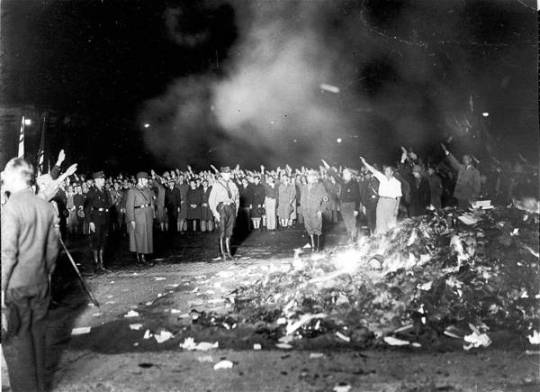
100,000 of us were charged with felonies. As many as 15,000 were sent to the camps, about 60% were murdered.
But in America the war brought liberation.
In a country where most people never even heard the word “homosexual” , historian John D’emilio wrote the war was “conducive both to the articulation of a homosexual identity and to the more rapid evolution of a gay subculture. (24)” The war years were “a Watershed (Eaklor 68)”
Now before we begin I need to give a caveat. The focus of this first post is not lesbians, transfolk or others in our community. Those stories have additional complexity the story of cisgender homosexual men does not. Starting with gay men lets me begin in the simplest way I can, in subsequent posts I’ll look at the rest of our community.
Twilight Aristocracy: Being Queer Before the War
I want us to go back in time and imagine the life of the typical queer American before the war. Odds are you lived on a farm and simply accepted the basic fact that you would marry and raise children as surely as you were born or would die. You would have never seen someone Out or Proud. If you did see your sexuality or gender in contrary ways you had no words to express it, odds are even your doctor had never heard the term “Homosexual. In your mind it was just a quirk, without a name or possible expression.
In the city the “Twilight Aristocracy” lived hidden, on the margins and exposed their queerness only in the most coded ways. Gay men “Dropping pins” with a handkerchief in a specific pocket. Butch women with key chains heavy enough to show she didn’t need a man to carry anything for her. A secret language of “Jockers” and “Nances” “Playing Checkers” during a night out. There is a really good article on the queer vernacular here
And these were “Lovers in a Dangerous Time.”
In public one must act as straight as possible. Two people of the same gender dancing could be prosecuted. Cross dressing, even with something as trivial as a woman wearing pants, would run afoul of obscenity laws.

The only spaces we had for ourselves were dive bars, run by organized crime. But even then one must be sure to be circumspect, and act straight. Anyone could be an undercover cop. If a gaze was held to long, or lovers kissed in a corner the bar would be raided. Police saw us as worthy candidates for abuse so beatings were common and the judge would do all he could to humiliate you.
Now Michael Foucault, the big swinging french dick of queer theory, laid out this whole theory about how the real policing in a society happens inside our heads. Ideas about sin, shame, normalcy, mental illness can all be made to control people, and the Twilight Aristocracy was no different.
While cruising a park at night, or settled on the sofa with a lifelong lover, the thoughts of Priests and Doctors haunted them. “Am I living in Sin? Am I someone God could love?” “Is this healthy? Have I gone mad? Is this a true love or a medical condition which requires cure?”
There was no voice in America yet healing our self doubt, or demanding the world accept us as we are. And that voice, the socialist Harry Hay, did not come during the war, but it would come shortly after directly because of it.
Johnny Get Your Gun… And are you now or ever been a Homosexual?
For the first time in their lives millions of young men crossed thousands of miles from their home to the front.
But before they made that brave journey they had another, unexpected and often torturous journey. The one across the doctor’s office at a recruiting station.
In the nineteenth century queerness moved from an act, “Forgive me Father I have sinned, I kissed another man” to something you are, “The homosexual subspecies can be identified by certain physical and psychological signs.”
These were the glory days of patriarchy and white supremacy, those who transgressed the line between masculine and feminine called the whole culture into question. So doctors obsessed themselves with queerness, its origins, its signs, its so called catastrophic racial consequences and its cure.
“Are you a homosexual?” doctors asked stunned recruits.
If you were closeted but patriotic, you would of course deny the accusation. But the doctor would continue his examination by checking if you were a “Real Man.”
“Do you have a girlfriend? Did you like playing sports as a kid?”
If you passed that, the doctor would often try and trip you up by asking about your culture.
“Do you ever go basketeering?” he would ask, remembering to check if there was any lisp or effeminacy in your voice.
Finally if the doctor felt like it he could examine your body to see if you were a member of the homosexual subspecies.
Your gag reflex would be tested with a tongue depressor. Another hole could be carefully examined as well.
Humiliating enough for a straight man. But for a gay recruit the consequences could be life threatening.
Medical authorities knew homosexuals were weak, criminal and mad. To place them among the troops would weaken unit cohesion at the very least, result in treachery at the worst. In civilian life doctors had much the same thing to say.
The recruit needed a cure. And a doctor was always ready. With talk therapy, hypnosis, drugs, electroshock and forced surgeries of the worst kinds there was always a cure ready at hand.
Thankfully the doctors were not successful in their task, one doctor wrote “for every homosexual who was referred or came to the Medical Department, there were five or ten who never were detected. (d’Emilio 25)”
Here’s the irony though, by asking such pointed and direct questions to people closeted to themselves it forced them to confront their sexuality for the first time.
Hegarty writes, “As a result of the screening policies, homosexuality became part of wartime discourse. Questions about homosexual desire and behavior ensured that every man inducted into the armed forces had to confront the possibility of homosexual feelings or experiences. This was a kind of massive public education about homosexuality. Despite—and be-cause of—the attempts to eliminate homosexuals from the military, men with same-sex desires learned that there were many people like themselves (Hegarty 180)”
And then it gave them a golden opportunity to have fun.
The 101st Airborn - Homosocial and Homosexual
“Homosocial” refers to a gender segregated space. And they were often havens for gay men. The YMCA for example really was a place for young gay men to meet.
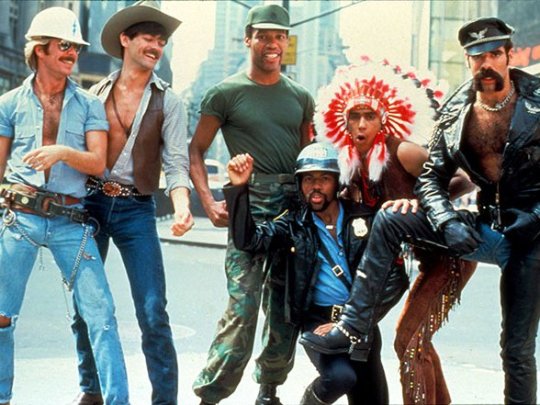
Now the government was already aware of the kind of scandalous sexual behaviour young men can get up to when left to themselves. Two major government programs before the war, the Federal Transient Program and the Civilian Conservation Corps focused on unattached young men, but over time these spaces became highly suspect and the focus shifted to helping family men so as to avoid giving government aid to ‘sexual perversion’ in these homosocial spaces.
But with the war on there was no choice but to put hundreds of thousands of young men in their own world. All male boot camps, all male bases, all male front lines.
The emotional intensity broke down the barriers between men and the strict enforcement of gendered norms.
On the front the men had no girlfriend, wife or mother to confide in. The soldier’s body was strong and heroic but also fragile. Straight men held each other in foxholes and shared their emotional vulnerability to each other. Gender lines began to blur as straight men danced together in bars an action that would result in arrest in many American cities.
Bronski writes, “Men were now more able to be emotional, express their feelings, and even cry. The stereotypical “strong, silent type,” quintessentially heterosexual, that had characterized the American Man had been replaced with a new, sensitive man who had many of the qualities of the homosexual male. (Bronski 152)”
Homosexual men discovered in this environment new freedoms to get close to one another without arousing suspicion.
“Though the military officially maintained an anti-homosexual stance, wartime conditions nonetheless offered a protective covering that facilitated interaction among gay men (d’Emilio 26)”
Bob Ruffing, a chief petty officer in the Navy described this freedom as follows, ‘When I first got into the navy—in the recreation hall, for instance— there’d be eye contact, and pretty soon you’d get to know one or two people and kept branching out. All of a sudden you had a vast network of friends, usually through this eye contact thing, some through outright cruising. They could get away with it in that atmosphere. (d’Emilio 26) ”
Another wrote about their experience serving in the navy in San Diego, “‘Oh, these are more my kind of people.’ We became very chummy, quite close, very fraternal, very protective of each other. (Hegarty 180)”
Some spaces within the army became queer as well. The USO put on shows for soldiers, and since they could not find women to play parts, the men often dressed in drag. “impersonation. For actors and audiences, these performances were a needed relief from the stress of war. For men who identified as homosexual, these shows were a place where they could, in coded terms, express their sexual desires, be visible, and build a community. (Bronski 148)”
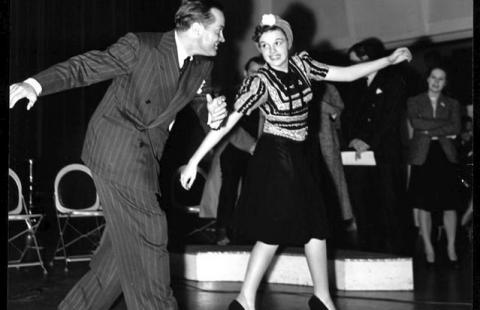
“Here you see three lovely “girls”
With their plastic shapes and curls.
Isn’t it campy? Isn’t it campy?
We’ve got glamour and that’s no lie;
Can’t you tell when we swish by?
Isn’t it campy? Isn’t it campy?”
The words camp and swish being used in the gay subculture and connected to effeminate gay men.
I would have to assume, more than a few transwomen gravitated to these spaces as well.
Even the battlefield itself provided opportunities for gay fraternization. A beach in Guam for example became a secret just for the gay troops, they called it Purple Beach Number 2, after a perfume brand.
This homoerotic space was not confined to the military, but spilled out into civilian life as well.
Donald Vining was a pacifist who stated bluntly his homosexuality to the recruitment board as his mother needed his work earnings, and if you wanted be a conscientious objector you had to apply to go to an objector’s camp. He became something of a soldier chaser, working in the local YMCA and volunteering at the soldier’s canteen in New York he hooked up with soldiers still closeted for a night of passion but many more who were open about who they were.
After the war he was left with a network of gay friends and a strong sense of belonging to a community. It was dangerous tho, he was victim of robberies he could not report because they happened during hook ups, but police were always ready to raid gay bars when they were bored. “It was obvious that [the police] just had to make a few arrests to look busy,” he protested in his diary. “It was a travesty of justice and the workings of the police department (d’Emilio 30).״
Now it might seem odd he was able to plug into a community like that, but over the war underground gay bars appeared across the country for their new clientele. Even the isolated Worcester Mass got a gay bar.
African American men, barred from combat on the front lines, were not entirely barred from the gay subculture in the cities. For example in Harlem the jazz bar Lucky Rendevous was reported in Ebony as whites and blacks “steeped in the swish jargon of its many lavender costumers. (Bronski 149)”
The Other War: Facing Homophobia
“For homosexual soldiers, induction into the military forced a sudden confrontation with their sexuality that highlighted the stigma attached to it and kept it a matter of special concern (d’Emilio 25)”
“They were fighting two wars: one for America, democracy, and freedom; the other for their own survival as homosexuals within the military organization. (Eaklor 68)”
Once they were in, they fell under Article 125 of the Uniform Code of Military Justice: “Any person subject to this chapter who engages in unnatural carnal copulation with another person of the same or opposite sex or with an animal is guilty of sodomy. Penetration, however slight, is sufficient to complete the offense.”
Penalties could include five years hard labour, forced institutionalization or fall under the dreaded Section 8 discharge, a stamp of mental instability that would prevent you from finding meaningful employment in civilian life.
Even if one wanted nothing to do with fulfilling their desires it was still essential to become hyper aware of your presentation and behaviour in order to avoid suspicion.
Coming Home to Gay Ghettos
“The veterans of World War II were the first generation of gay men and women to experience such rapid, dramatic, and widespread changes in their lives as homosexuals. Bronski 154”
After the war many queer servicemen went on to live conventionally heterosexual lives. But many more returned to a much queerer life stateside.
Bob Ruffing would settle down in San Francisco. The city has always been a safe harbour for queer Americans, made more so as ex servicemen gravitated to its liberated atmosphere. The port cities of New York, San Francisco and Los Angeles became the prime destinations to settle. Vining’s partner joined him in New York, where they both immersed themselves in the gay culture.
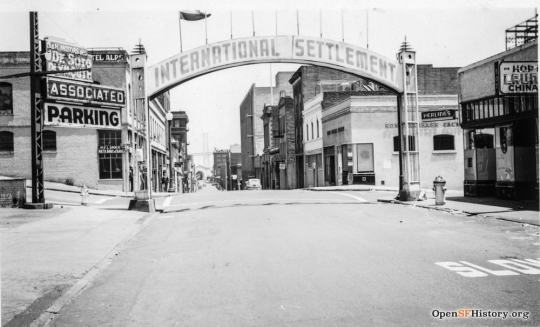
Other soldiers moved to specific neighborhoods known for having small gay communities. San Francisco’s North Beach, the west side of Boston’s Beacon Hill, or New York’s Greenwich Village. Following the war the gay populations of these cities increased dramatically.
The cities offered parks, coffee houses and bars which became queer spaces. And drag performance, music and comedy became features of this culture.
These veterans also founded organizations just for the queer soldiers. In Los Angeles the Knights of the Clock provided a space for same sex inter racial couples. In New York the Veterans Benevolent Association would often see 400-500 homosexuals appear at its events.
A number of books bluntly explored homosexuality following the war, such as The Invisible Glass which tells the story of an inter racial couple in Italy,
“With a slight moan Chick rolled onto his left side, toward the Lieutenant. His finger sought those of the officer’s as they entwined their legs. Their faces met. The breaths, smelling sweet from wine, came in heavy drawn sighs. La Cava grasped the soldier by his waist and drew him tightly to his body. His mouth pressed down until he felt Chick’s lips part. For a moment they lay quietly, holding one another with strained arms.”
Others like Gore Vidal’s The City and the Pillar (1948), Fritz Peters’s The World Next Door (1949), and James Barr’s Quatrefoil (1950) explored similar themes.
In 1948 the Kinsey Report would create a public firestorm by arguing that homosexuality is shockingly common. In 1950 The Mattachine Society, a secretive group of homosexual Stalinists launched America’s LGBT movement.
References:
Michael Bronski “A Queer History of the United States”
John D’emilio “Coming Out Under Fire”
Vivki L Eaklor “Queer America: A GLBT History of America”
~~~~~~~~~~~~~~~~~~~~~~~~~~~~~~~~~~~~~~~~~~~~~~~~~
The Lesbians
In 1947 General Eisenhower told a purple heart winning Sargeant Johhnie Phelps, “It's come to my attention that there are lesbians in the WACs, we need to ferret them out”.
Phelps replied, “"If the General pleases, sir, I'll be happy to do that, but the first name on the list will be mine."
Eisenhower’s secretary added “"If the General pleases, sir, my name will be first and hers will be second."
Join me again May 17 to hear the story of America’s Lesbians during the war.
21 notes
·
View notes
Text
White masculinity shifting: a case study
I get an untold number of messages in my inbox from anons who all come to me with a similar problem: they are white males who describe themselves as submissive/beta/sissy/wannabe cuckolds or any such term, are deeply unsure about their role in the world and would like to hear my advice on that.
I have talked about this in the past and tried to do the Jordan Peterson bit where I encouraged them to clean their rooms and branch out into the interracial dating market on their own, but this seems to often fall on deaf ears; perhaps because you guys are too busy watching porn, but also, when your testosterone dips below a certain point, I guess the prospect of competing for women feels somewhat daunting.
Recently I had the pleasure of exchanging thoughts with a user who went off anon to contact me and was willing to answer some questions. I think his situation is fairly typical of many anon askers and he was excited to be a bit of case study for this topic, so gosh, I guess we need to talk about white males again, don’t we? They always seem to find a way into the conversation!

White Guy Problems: the cause
I’ve mused at length about the cultural reasons for white male insecurity and we don’t need to rehash it in detail here; suffice it to say that when an overwhelming number of your athletes, musicians, pop culture icons and lately also political actors are people of color, your somewhat justified feeling that you’re losing your somewhat unjustified #1 spot in the world might dampen your self-esteem a bit. More on this topic can be found here or here.
There’s also a biological effect going on in the background, namely that Western men’s testosterone levels have been steadily dropping in the recent past. Notice that the descriptor here is locational (Western) rather than racial, but “Western” is often used as a less fraught stand-in for “white” and we also know testosterone levels are related to life adversity, so sorry, your comfy middle class upbringing really did a bigger number on you there relative to Black and Brown men who had to struggle for a living. Sperm counts have been dropping at the same time of course, but that seems to be more of an effect than a cause.
So what we have here is a situation where our culture isn’t exactly boosting traditional white masculinity while many white men are also drawn towards greater physical and behavioral androgyny by their hormonal biology. Which is perhaps why the biggest beauty influencers on YouTube now look like this:

White Guy Problems: the effect
And this brings us to our case study. He’s a white male entering middle age who doesn’t identify as gay, genderqueer or any other particular label; he’s just doing his thing. He’s had relationships with women in the past, but never felt an urge to assume a dominant position behaviorally or sexually. In fact, he claims he was always aware of his submissive tendencies, but tried not to let it show in order to fit in better as a man.
This somewhat changed after he discovered interracial porn. I’ll let him speak for himself here:
Not only did it show me what sex (real sex) was, it also confirmed and cemented my feelings of inadequacy. I was hooked! Over time, much spent viewing Black men bringing immense satisfaction to white women, my focus gradually became centred on the main source of that satisfaction: the Black Man’s penis. It was as though it became a reference point for all things pleasurable, and my fascination and awe just grew from there. That Big Black penis was what I was staring at when I furiously rubbed on my own incompetent white penis, so stiff with admiration and respect.
The phallus worship expressed here eventually seeped into real life, where he headed out to a sex shop to look for a physical representation of his desires:
I was going to leave at one point, but I thought since i was there i might as well just get it over and done with, so i picked a 10 inch jet Black realistic looking rubber dong, two bottles of lube, paid for it and left. I was so relieved to be out of there and couldnt wait to get back to my hotel room. I stripped off and opened the package, and let me tell you, just holding that thing was an amazing rush, feeling the weight and girth of it, and the contrast of it in my white hands. It was like i was quivering, butterflys in the stomach.
Now you’d be excused to think that this man is just very gay and in denial, but I really don’t think that’s it. For one thing, a submissive gay man wouldn’t necessarily be intimidated by a masculine partner; he’d see him as complementary rather than competition. A gay man would also feel very compelled to just go out and get the real thing, whereas our case study never did. Of course there are closeted gay men who never live out their desires, but they often fell into a heterosexual marriage or their living circumstances make it otherwise impossible to live out their sexuality. This was not the case here.
What this sounds like to me is a fundamentally heterosexual man who, for whatever reason, just doesn’t quite have it in him to be sexually assertive and find or please women that way, and who ends up somewhat transfixed on the kind of man who seems to be able to do that effortlessly. Given the setup of interracial porn and the larger cultural influences on his life, this kind of man ended up being Black, of course. So our white male case study developed a fetish in the original sense of the term: worshiping someone or something for a perceived inherent power. A worship that is tentatively sexual, but never quite crossed that threshold.
Our case study thinks he is somewhat representative of the white men who hang out in circles like these. I’ve certainly met enough of them to say that he’s part of a larger subdemographic, perhaps the largest one.
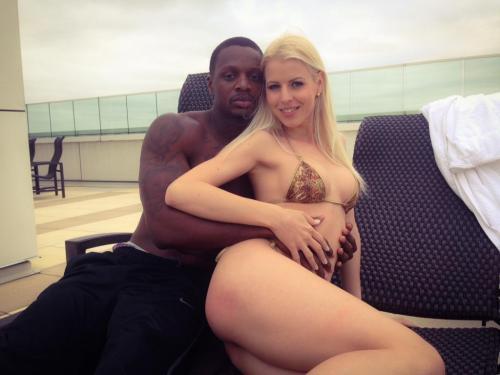
White Guy Problems: the solution?
I just gave you my best Sigmund Freud impression there, but I’m not a therapist and I’m not quite sure what the proper course of action for someone like this should be. He would probably be quite happy in a cuckold relationship, but this poses the problem of finding a relationship in the first place, which we already discovered was not one of his strong suits. He could try gay sex to see if maybe he likes it enough to pursue it. If the overall male body is a turn-off for him, he could maybe start with a glory hole, where it’s just the phallus.
He also confessed to having a weakness for transgender women, which will probably not surprise anyone. This, too, could unfortunately be a bit of a compatibility problem since he likes them specifically for having a penis while many transgender women embark on their journey specifically because they don’t like having a penis.
Man, these white guy problems are really tough. Of the options listed above, I think the most realistic would be to find a woman who can adapt to his submissive sexual desires and is willing to humor them or maybe even gets off on it herself. I would imagine you don’t need to be a stud to please this kind of a woman; she’d probably be looking for other qualities in the first place. But I couldn’t tell you where to find her, though I have talked to men who did find such women, so it’s clearly not impossible.
In the meantime, I guess he’ll have to keep himself happy with copious amounts of porn, which many white males of his persuasion seem to settle into as a consolation prize. I’m not sure how sound this is in the long term, so I’ll revert to Jordan Peterson again at the end of this post and suggest that cleaning your room and standing up straight with your shoulders back might work wonders for you even if your testosterone levels are a joke compared to your great-grandfather.
And now that I answered this concern in book length, I expect all you betas out there to ask more diverse questions in the future.

184 notes
·
View notes
Note
weird and rude questions i've been wanting your opinion on; sorry in advance
1) what is comphet actually? before hearing how people used the term i would have thought (two examples from lesbians i know irl) either a) 100% attracted to women and literally ends a friendship if a guy makes a move yet feels the need to go on about how male celebrities or even men we know are hot or b) uses strap on won't let me drive even when we travelled overnight and it would have been easier to switch uh i'm failing for examples but basically her personality is extremely male; granted she's mostly converting women who have until her dated men; most of it is natural but sometimes she's just going out of her way to not be too lesbian or be more like a guy for women she's attracted to, for instance taking over and managing every single thing (granted most people are stupid and perform badly but still, you don't always need to point out when people are idiots bc they will feel bad and start blubbering and it's unsightly, plus unfortunately in this world 90% of things don't need to be done well). it's not like she's unrealistic in any way, she's even far too smart to be deeply self-loathing but, i mean i'm not too sensitive to people but i can tell when people are twisting themselves around yk? so if she makes additional effort it's painful for me too; actual men are already pathetic crybabies next to her so she doesn't need to do anything extra (and there are plenty of people who would still hang out w her even if she went 'feral', only taking care of her own needs and doing whatever she wanted)
that was very rambling but do you see what i mean? gender roles can be an amusing reflection but can't they also become a prison if the person running things isn't attuned to their own desires? like you've probably pointed out before, it's female training to be overly concerned with how things look
or perhaps i'm just extravagantly egoistic and not house-trained enouhg to make time w other people
2) do you think life is marginally easier for straight women or is being female just uniformly crap
compulsory heterosexuality in its original conception describes the political lesbian mindset that all women regardless of sexual orientation will feel compelled to be in heterosexual relationships due to societal pressure. the extension of this perspective is that women should choose to be with other women regardless of this. for those you keeping score at home this is dumb as shit for several reasons including 1) gay people (yes, including women) have always lived lives separate from heterosexuality. not all gay people everywhere ever but no matter the time period, no matter the region, there will ALWAYS be gay people who never marry, never have straight sex, never have kids; bc ultimately no amount of societal pressure (even of the extreme variety) will ever make a gay person want to be in a straight relationship. 2) we have a phrase for what causes gay men and women to remain closeted in an unhappy straight relationship: internalized homophobia. (combined with external danger in some cases) but this phrase doesnt allow people to handwave away their bisexuality or convince other people to do the same so its unpopular.
as for your friend i dont see why you assume shes got some sort of masculine affectation instead of just being sort of overbearing lol but i dont know her. i do think the sort of behavior policing that goes along with Gender Identity is pretty inherently feminine
as for your last question i frankly do think it probably sucks more to be a straight woman. being female is sort of a state of looming humiliation anyway i sincerely cant imagine what its like for women attracted to men.
5 notes
·
View notes
Text
@eiriee replied to your post “@butyouvealwaysbeenthecaretaker replied to your post “I hate to say it, but...”
Do you have any posts on your thoughts regarding Bi: Notes? It's been on my shelf for years & I've read some of it but not finished.
I do, but they’re older and mostly rambling. The trouble I have with the book is that there’s so much content and framing that I disagree with that it’s hard to hold it all in my head and draw out a structured criticism for it. It’s been quite a while since I looked through it, but here are a couple of things I discussed in my older posts.
So, you know how some people will say that hostility toward women-loving women or woman-woman couples that’s expressed in the language of “lesbians” or “dykes” isn’t really about bi women? Eisner pulls a similar move to put bi women and biphobia at the center of harassment against WLW. They have a section on Sexual Violence in Chapter Four where they talk about men pressuring bi women (and also lesbians) to engage in threesomes or “perform bisexuality” by making out with other women. They then say (bolding mine):
At this point, some of you might be wondering why I consider these types of violence against bisexual women [men harassing women who make out in public, men asking if “they can watch,” etc] as biphobic rather than lesbophobic, since lesbians are often harassed in very similar ways to the ones I described. This is biphobia, however, rather than lesbophobia because this type of harassment is based on biphobic beliefs and perceptions even when they are aimed against lesbians. As explained throughout this chapter, the logic of this type of sexual violence is that bisexual women are “actually straight,” or only performing their bisexuality for male pleasure. When lesbians are harassed in the same way, they are first presumed to be bisexual, and then attached with the same biphobic notions used against bi women. What happens here is a combination of lesbophobia and biphobia: Lesbians first have their lesbian identity erased, and then are presumed to be “actually straight” as a result of being presumed as bisexual. Thus, biphobia constitutes the center here, and remains biphobia even when it is aimed at lesbians.
What we can see here is that this type of biphobia not only harms bisexual women, but also monosexual women, as it is also aimed against them. As explained above, lesbians often receive the same type of harassment as bisexual women when being affectionate or sexual in public. Heterosexual women are often also subject to pressure by strait men to perform bisexuality (privately or publicly) for their pleasure. In many communities (especially ones that consider themselves "alternative," "open," or "liberal"), performative bisexuality might be a standard that all women must meet. This means that in those communities, women are expected and pressured into being sexual with other women for the satisfaction of straight men. Although this mostly harms bisexual women (who are presumed to want this simply because they identify as bisexual), it also works against monosexual women.
What all of this means is that biphobia against women is not only the concern of bisexual women, but of all women regardless of their sexuality identity. [...]
This differs from the “misdirected lesbophobia” discourse, because they’re arguing that all women can be negatively affected by biphobia, and present this as a reason that people should take biphobia seriously. The people who argue that expressions of lesbophobia toward bi women are just “misdirected” are more often emphasizing a disconnect between the effect it has on bi women versus lesbians, and want to see this hostility as “really” only about lesbians (so that “dyke” as a politicized identity is the cultural property of lesbians exclusively). So Eisner’s not being as stingy with the centrality they claim for bisexual subjects in this type of harassment, but it’s still a shit move and denies a lot of ground to what can be considered “about” lesbians.
Ironically, I think Eisner and the “misdirected lesbophobia” camp talk about lesbophobia in a similar way, where the subject of “lesbophobia” must be understood--even by homophobes--as a woman who is exclusively attracted to women. The “misdirected lesbophobia” camp say that “a woman who is exclusively attracted to women” is what’s really on the homophobe’s mind when he calls a woman “dyke,” and therefore the insult can’t be about bi women, while Eisner presumes that a man harassing a woman to perform for him must believe that she’s genuinely open to men and therefore cannot really see her as a lesbian.
I think both sides misunderstand the slippages that occur when people see expressions of woman-women eroticism. I would argue that homophobia against women (which I would just call lesbophobia) often involves a denial that woman-woman eroticism is real/final, and that any women should be permitted to have sexual relations and identifications outside of particular heterosexualities. In other words, it’s possible for someone to know that there are women in the world who call themselves “lesbians” and claim to only like women, and to believe that this phenomenon is bad, without believing that “women who only like women” actually exist. If such a person argues that “lesbians” are just women who can’t get a man (an argument which presumes they want men), this is still a message about what self-identified “lesbians” are like, even though it totally dismisses their own understanding of their lesbianism. But going further, this message isn’t just “about” self-identified lesbians either, because it’s implicitly a message about all woman-woman eroticism and identifications, including bi women’s identity and desire toward women. Arguably, it’s even about women more broadly, in that it suggests that getting a man is a central preoccupation for women, and that perceived rebellious from women can be dismissed as a petulant reaction to failure in this area, rather than a reflection of agency and goals beyond patriarchal expectations.
In any case, it’s inaccurate to claim that this kind of harassment can’t really be “about” lesbians. Eisner’s logic isn’t consistent here, as you’ll notice. If a lesbian is treated as though she were open to men, they reason that actions toward her are reflective of attitudes about bi women specifically, not lesbians. But when a bi woman is treated as though she were “actually straight,” they don’t conclude that actions toward her must reflect attitudes toward straight women, not bi women or lesbians. There also isn’t an option for lesbians to be directly perceived as “actually straight,” even though this isn’t uncommon. Any suggestion that a lesbian might be open to men automatically moves the topic to bi women, meaning that there’s a whole huge area of lesbophobia that fundamentally has nothing to do with lesbians. (I think this move is cruel and outrageous, even if it’s a reversal of a move often used against bi women.) I also think they make the mistake of presuming that men only pressure women whom they think will be open to their advances. While the idea that women might eventually “like it” can be used as rationalization for this behavior, I think the behavior is rooted more in a simple lack of concern for women’s interests and boundaries, when men expect that they can get away with ignoring these.
Eisner makes similar moves in other places. Here they are talking about “lesbian” porn:
Following all of this, I think it would be more accurate to discuss “lesbian” porn in terms of bisexuality. If we follow from the sexual acts performed by the women appearing in these types of scenes, it would be very hard not to notice that bisexuality is here at work. The women in scenes titled lesbian have sex with each other, as well as with men. Even in scenes where no man is present at all, the logic behind the activity is still bisexual, since the women are perceived to be performing for a cis straight male audience.
These representations of bisexuality, in turn, contribute to the cultural construction of female bisexuality as we've seen it in the media depictions above. The media take up on the pornographic logic of bisexuality and send the same messages, but in covert ways. Thus, looking into pornographic representations of bisexual women might help us shed light on social and cultural treatment of female bisexuality in general.
Instead of recognizing the possibility for slippages in meaning, or that there can be inaccurate messages about lesbians as well as bi women (e.g. lesbian sexuality can also be regarded as a performance for men), Eisner finds in these representations an essential and exclusive bisexuality. Now, I do think that media representations of “lesbians” also inform attitudes toward bi women, that looking at them can be useful, and that representations of “lesbians” can simultaneously be representations of bisexuality. But I think it’s a silly exercise to claim that “lesbian” porn is only depicting bisexuality, as if the (fictionalized) dynamics depicted in media have their own independent and singular reality which can be empirically determined. Just a couple paragraphs above this, they obverse that “[t]he women's sexuality is irrelevant since the definitions are not about them but about the men fucking or watching them.” They should have gone a little bit farther with this idea, in my opinion!
While there are times when it makes sense, I think there can also be a danger in treating bisexuality as a singular expression, encompassing same-gender and man-woman relations, when these relations have very different positions in society. I think Eisner tends to treat bisexuality as a singular, marginalized expression that needs protection, including from gay people, in a way that can end up aligning with heterosexism. I don’t remember if this idea featured in their book, but they once made a post saying:
All gay and lesbian readings of mainstream movies and TV are based in bisexual erasure. Because in order to read characters as gay or lesbian, it is necessary to erase the character’s different-gender attraction and relationships.
It’s telling that they’re talking about “characters” having different-gender attraction, because of course these sexually-unmarked, mainstream “characters” are actually imagined, depicted, and normally received as straight. Eisner is again employing some weird media analysis where characters, even across individual imaginings (i.e. from the original creator’s depiction to a fan depiction), seem to have an independent reality. So interest in man-woman relations is an essential part of the character, always. Then, when you want to imagine that the character is interested is same-gender relations, you can only add that as an additional fact, thus making the character bisexual. And then, by becoming part of a (hypothetical) singular bisexual expression which is uniformly marginalized, canon man-woman relations now need protection against gay readings that would “erase” them. Even though these are actually straight characters in heteronormative media. The end result is that we’re meant to always uphold man-women relations as integral to a character’s (or anyone’s?) sexuality and identity.
In general, my impression when reading the book was that Eisner solely wants to look at identity or group belonging as the site of oppression, and doesn’t want to give any attention to the ways that man-woman relations themselves may be relatively valued, legitimized, and enforced over same-gender relations. I can understand the reluctance to look at those processes, since bi people’s potential engagement in man-woman arrangements is often used to deny their sexualities and the possibility that they could face any problems, or even an intensification of problems in some areas over lesbians or gay men. But these processes are still an important part of patriarchal gender systems, and need to be part of the analysis. I don’t have a good quote for it, but this one might suggest a bit of that line of thought:
The idea of passing as an act of disguise presumes an essence of identity. Without a "true core," a disguise becomes impossible, for the very meaning of disguise comes from the discrepancy between what one "is" and what one is "seen" and "understood" to be. However, instead of being an essentialist notion, passing can subvert these presumptions by showing, in practice, that appearances--including one's very body--are no guarantee for the "truth" of one's identity. From this point of view, passing becomes particularly useful in demonstrating the way in which all identities and appearances are socially constructed, the way identities are written into our very bodies, and the enormous fragility of these constructs themselves.
In the case of bisexuality, we might look at society's insistent attempts to naturalize both homosexuality and heterosexuality, appealing to bodies, genes, hormones, and brains in order to establish that "this" (the sexuality in question) is inborn, natural, and immutable. Under this logic, one is either "born" gay or "born" straight, and thus any performance of their desires is "true to its nature." Being in a same-gender relationship presumes homosexuality, and being in a different-gender relationship presumes heterosexuality, because one's relationship choices are understood to reflect one's inner essence. Bisexuality— and bisexual passing—short-circuits this circular logic by showing that “acting gay” or “acting straight” does not necessarily equate with “being gay” or “being straight.” It allows us to distrust visual presentations and to deconstruct claims of inner essences. In this way, bisexuality may again be one way out of rigid identity constructs, a way of resisting both the lines of separation imposed by them and the hierarchies built upon them.
That’s nice, but you actually don’t need to imagine that same-gender acts stem from a different innate character in order to condemn them, or to institutionalize heterosexuality to the detriment of other pursuits. You don’t need naturalized concepts of essential heterosexuality and homosexuality in order to have a “hierarchy” among social arrangements and practices. In fact, ambiguity between subjects and the inability to finally “prove” that a person is one way or another can actually be beneficial to oppressive systems. When there’s ambiguity, more people can come under scrutiny and face demands to continuously prove themselves by conforming to gendered expectations or distancing themselves from marginalized subjects and practices.
That goes back to my original complaint that bi theorists focus too much on minority sexual discourses. Man-woman sexual relations and kinship can be institutionalized (while same-gender ones are stigmatized or denied) without any reference to “heterosexuality” as one of multiple sexual orientations. It does NOT need a corresponding “homosexuality.” The “gay-straight binary” is not a crucial linchpin within systems of gender. These discourses on sexual orientation do exist and do have more institutionalized backing now, so that more people are now forced to engage with them at some points. But I still don’t see them as really universal or fundamental to gender/patriarchy overall. I think the exclusive focus on discourses of “sexual orientation” leads to distorted analysis, because there’s just more going on in society.
There were just so many things they said that I objected to, and I really just don’t agree with their whole approach.
Although, I was originally complaining about another paper I was reading, which seems to be a Master’s thesis (although that’s hard to believe, because it’s so bad). It’s “The Bisexual To Be Corrected: Interrogating The Threat And Recuperation Of Women's Femme Bisexuality,” which can be found here. This was one part that I thought was especially... lackluster:
As several women I interviewed point out, heteropatriarchy needs people to be monosexual, or attracted to only one gender, in order to neatly hierarchize. It is rather difficult to maintain the disenfranchisement of a group if that group is incoherent, with its members presenting in different ways that shift, slip, and take on a variety of meanings. The notion that women can be attracted to men, women, and other genders simultaneously is a threat, because it points to the fact that perhaps masculinity and femininity, men and women, are not such polar opposites at all... and if men are not the powerful, aggressive, dominant opposites of women, why should they be at the top of the hierarchy? If masculinity is not the opposite of femininity, then perhaps all men are more intimately related to femininity than they would like to think. This line of thought destabilizes the patriarchal order, so monosexism and biphobia punish bisexuals for their attraction to multiple genders—and more specifically, for destabilizing the gender binary. Bisexuality must be erased, invisible, and invalid because it threatens core values of patriarchy that organize and define our culture. [...]
Again, this relies heavily on the idea that clarity between groups is necessary for hierarchy, and that ambiguity is automatically destabilizing rather than beneficial. (Like, not only does ambiguity extend the circulation of the power-effects of these discourses among more subjects, as Storr would say, but it also provides a measure of flexibility to the system: if you can’t condemn and/or recuperate something using one approach, you can try a contradictory approach.) Even beyond that, the idea that you need “facts” and “consistency” in your oppressive ideology is obviously baseless. The author’s understanding of heteropatriarchy is again focused only on categories of people, even though behavior itself can be regulated (and categorized), and everybody’s behavior is subject to regulation within systems of gender. While I think that gender dualism is very relevant to how bisexuality is understood, my thinking is more that bisexuality won’t be a non-issue until gender dualism is undermined, and less that the very existence of bisexuals inevitably results in the undermining of gender dualism. This paper also seems guided by the goal of uncovering intrinsic and maybe unilateral subversiveness in certain groups of people, and I’ve grown kinda w(e)ary of that.
25 notes
·
View notes
Text
This conversation in a major mainstream celeb culture group on FB, about the author of “Love, Simon,” is really making me despair that a majority of younger people may not really believe that authors should be allowed to be private citizens, because they weren’t alive at any point when those authors *were.* And I really feel like this is a case where the young people are going to get their way just by numbers, and older LGBTQ people and younger ones will just end up talking past each other. *Most* people in that thread (huge number, and in a group with huge membership) seemed to believe that anyone not willing to be “out” as an LGBTQ person, shouldn’t profit from anything pertaining to LGBTQ culture. And I have a problem with this! So... only very deeply privileged people from liberal families, who either can afford to not have a day job or who work for companies that aren’t going to fire them for being LGBTQ, get to write LGBTQ material?? Only people under 30, for that matter, get to write LGBTQ material? (Because I really feel like something most people don’t understand and most fucking zoomers don’t care about, is that older people in the same marginalized categories as them *may move predominantly in older circles* and may not experience as much broad acceptance as they take for granted. It being more accepted for a 20 year old to be gay, doesn’t make things automatically better for a gay 50 year old.) This is useful representation HOW?? How does it represent a lot of actual LGBTQ people if the only works they get to read are written by the LGBTQ equivalent of Lena Dunham?? And how are we going to vet people for belonging to the right group, having the right representative experience, before they are qualified to write LGBTQ material... is there some kind of Gay Police or something that’s going to check this out? At what point are you Gay Enough? This is actually a generational issue for me because of the degree to which LGBTQ writing, when I was younger, was underground, and the degree to which even mainstream authors were still private citizens. A huge majority of the material you formed your identity to, when I was younger, would’ve been authors who at the time were only well known within the very, VERY subcultural spaces of LGBTQ community. Even fanfic was an underground space. Many authors were pseudonymous, there were small imprint niche publishers, there was stuff that was only published in underground mags and zines. (Alison Bechdel is from *my time* but... if you’re outside of LGBTQ culture or you’re under 40, then you may not have even begun hear about her until the 2010s. There were lots of authors well known within LGBTQ spaces who weren’t well known outside of those spaces. And there were also lots of pseudonymous authors.). Basically there seems to be this attitude where you should only be able to write LGBTQ material if you are a Very Online, 20something “professional queer” who is willing to be totally transparent about your life on social media. Or to even write LGBTQ characters at all. Will we at some point stop even seeing works that have diverse ensembles? Do all books have to be written by committee now so that you have the proper representation, unless you’re willing/able to write a totally monoculture book? Who gets to be on those committees? Do you have to go to a specific university to qualify? Do you have to have the right degree and belong to the professional-managerial class or the academic elite to acceptably write material pertaining to any kind of marginalized identity? And are we seeing the end of individual authorship outside of the self-publishing market and/or the individual authors who were already grandfathered in? Don’t you see how this just feeds into EVERYTHING BEING CORPORATE FRANCHISES and just makes writing MORE privileged and elitist? Then there were generational assumptions wherein somebody who’s been in LGBTQ culture for a long time wouldn’t know about anyone who’s not the same letter of the LGBTQ. I know it’s generational because of having been in LGBTQ culture in the 90s. As if there is absolutely no history of adjacence between communities. As if there aren’t trans people who formerly identified as gay and were part of the male or female gay communities, as if there aren’t bi people who’ve been in the community and involved with gay people, as if all trans people or gay people or bi people came out in high school or college, and as if members of the LGBTQ don’t ever, ever socialize with each other or share the same spaces. (Which is some ahistorical bullshit.) And all of this has led me to believe, with this preciousness around narratives and there being ~The LGBTQ Experience~ vs ~the Cis Het Experience~, what do they think *straight* people live like? If you’re hetero, you necessarily live in the suburbs and have 2.5 kids, or something, and don’t EVER know LGBTQ people and have zero experience with that community whatsoever? How far are we going to take this, should we just go full horseshoe and say that LGBTQ people aren’t qualified to write cis het characters (and thus LGBTQ people excluded from most writing except for the heavily elitism-based token positions we’ll be allowed?) Plus, are you assuming that every person who presents the optics of being in a hetero relationship, is a heterosexual, and or is cis and or their partner is? These assumptions about how social worlds work, don’t actually describe even one social space I’m in, or have EVER been in. Maybe they describe your social world if you grew up in a totally homogenous, utterly heteronormative (and probably religious) social space and then came out into LGBTQ culture on an upscale college campus in a college town, then managed to socially bubble up with the other cool queer kids in either your upper middle class hipstertopia town, or some corner of fandom culture, or you bubble up so hard that you only interact with a handful of handpicked people online in your specific handpicked spaces that only, only ever match you, and match you 100%. But they don’t describe the experiences of even most LGBTQ people. Like... the discourse I grew up with, was, “you have the right to write this, but damn, maybe I’m not going to read it.” But now we’re in a space of... who has the right to write at all? And I’m sorry but that’s just fucking dystopian.
25 notes
·
View notes
Text
Justice League #1 (1987)
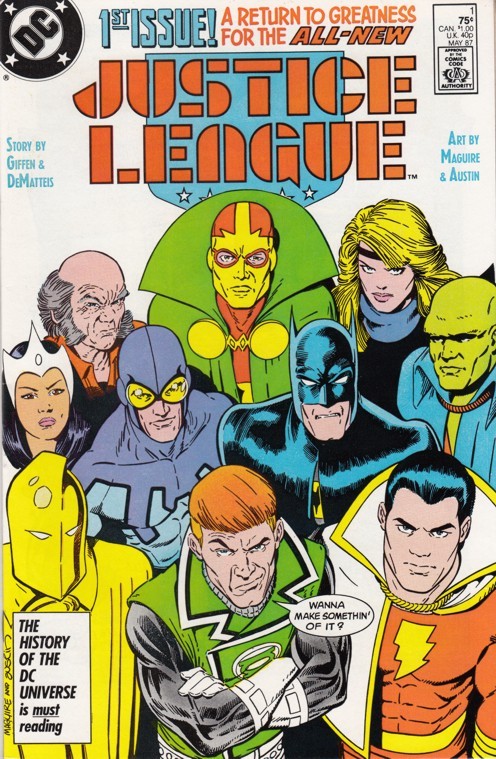
This is actually a more impressive line-up than I remember.
I'm pretty sure this line-up is a huge scam. I don't remember Doctor Fate interacting too much with this group and I think Shazam bows out fairly quickly. Batman probably does that thing where he acts like he's leader (even if Martian Manhunter actually is) and only helps out every sixth mission. So at that point, the line-up is already decreasing in strength and intimidation factor quickly. Adding Fire, Ice, and Booster Gold later won't really improve the team much. But I'm getting ahead of myself. My impressions from this initial cover were "Wow! Pretty interesting team!" and "What asshole fucking decided on the shit stencil font for the title?" Sorry, I cuss a lot when I'm writing on the Internet and trying to seem like a bad-ass. The issue begins with Guy Gardner calling the other Green Lanterns jerks and suggesting, to himself, that he should be the Commander-in-Chief of the new Justice League. Some people would read this first page and think, "What an arrogant fucking asshole." But my stomach got all queasy and I giggled a little bit and I muttered quietly under my breath, "I love him."

I'm not saying it isn't composed of some truly ridiculous aspects but Guy still has the best costume in the DC Universe.
I don't love everything about Guy Gardner because most writers at the time didn't truly understand him. They made him a jerk that nobody would like because they were too cold-hearted to see the brain damaged cool guy that he really was. Guy Gardner often needed to be written by somebody who loved the character; it would have done him a world of good. He could still have been that abrasive jerk. But written deftly, those who actually cared to take the time would see his true self. Sure, that would also be an abrasive jerk! But a little bit more likable!
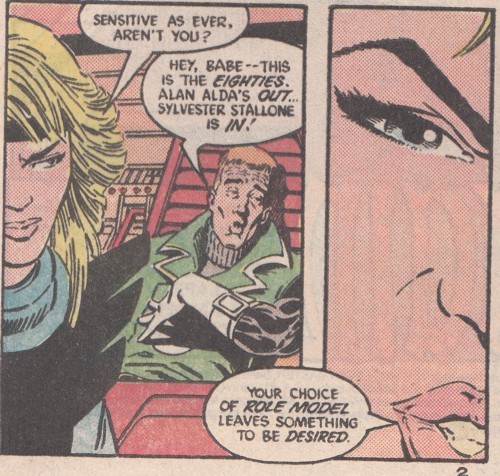
Stallone was pretty sensitive in a few scenes in Rocky IV!
Black Canary is second to arrive, after which Mister Miracle and Oberon show up. I never quite understood how Oberon fit into the Justice League. Wasn't he like an agent or a manager? Did Batman and Martian Manhunter need Oberon to sign off on every mission or else Scott Free would have to remain behind? I bet he was included just so Giffen and DeMatteis could make dwarf jokes.
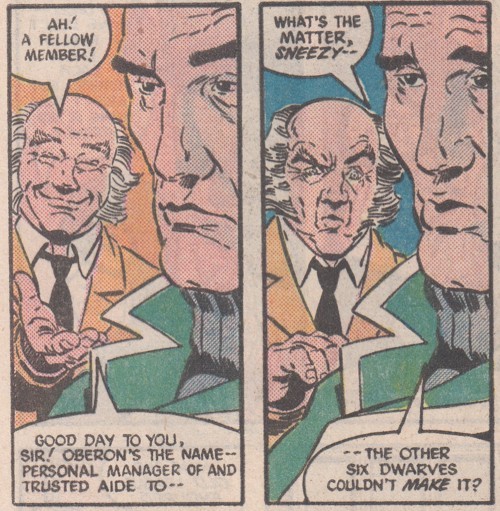
Why would Guy choose Sneezy?! Oberon's breathing has been impeccable since he arrived!
Normally after some kind of cynical prediction about the comic book that immediately is proved true, I'd write, "Grandmaster Comic Book Reader!" But it doesn't feel right to say it in this case. I mean, Oberon is present for four panels before he becomes the butt of a joke based on his diminutive nature. And by Guy Gardner, no less! Is this why I loved him so much at sixteen?! What a terrible and typical sixteen year old white heterosexual male I was! Black Canary (whose costume I'm just now noticing is really fucking weird) responds to Guy's awful behavior by saying, "Dozens of GLs around and we get 'Rambo' with a ring!" That's unfair to Rambo! I'm also unsure who in this story (including the writers of this story) have actually seen First Blood. Gardner is more like the authority mad Sheriff Teasle than the sensitive green beret John Rambo! Rambo should be admired as a hero, battling back against corrupt cops who think they have the right to use as much force as they want for any stupid fucking reason! It's possible they were talking about the Rambo from the second film who gets to kill more than one person because the people he's killing are Russians and Vietnamese. He does get a bit murder crazy in the second film. Or maybe they're talking about Rambo from the third film which wasn't actually out yet so I don't have to read up on it. Next to arrive are Captain Marvel, Blue Beetle, and Martian Manhunter. Martian Manhunter proves to be a buzzkill, reminding everybody how the old series ended in total death and disaster.
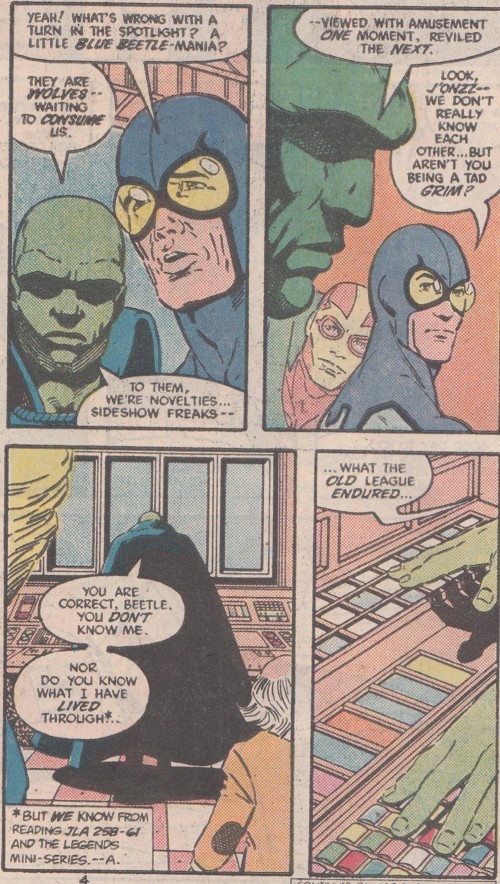
His view of the media is pretty spot on though.
J'onn calls up the files of Steel, Gypsy, Vixen, and Vibe before purging them completely from the Justice League computer. That's probably a good idea, like deleting old joke tweets on Twitter that were a bit racist and also boring. Meanwhile Maxwell Lord IV watches from a distance, doing that Ozymandias thing where you watch dozens of televisions at once. I think it proves you're a genius whose done the research and contemplated all sides of an issue before making up your totally rational and logical mind about any issue. As opposed to us losers who simply use compassion and empathy to almost immediately understand the correct and most ethical path to take. Maxwell Lord IV watches all of this television and decides the correct course to take is to leave the "America" off of the Justice League of America this time. Oh, and also the "of".
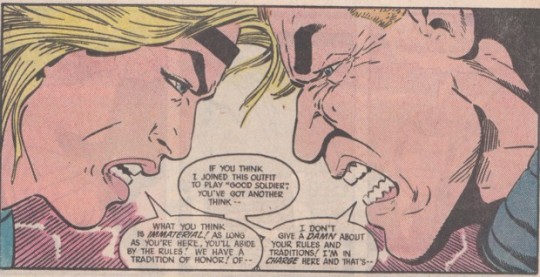
Maybe this is why I liked Guy so much: because he knew the saying was "you've got another think coming." Look, I'm going to be desperately finding good reasons to have liked Guy Gardner so much when Giffen and DeMatteis are this determined to make him a huge and unlikable jerk.
Look, I was sixteen! Hardly the best time in a young man's life for qualities like compassion and empathy and fashion sense and hair styles! I'm also fairly certain it wasn't this comic book that made me like him so much. I'm pretty sure he gets knocked out by Batman with one punch before the year is over and I remember loving that scene. So I probably despised him like a good reader of Justice League was supposed to do. Hopefully he'll have some character moments during this series that will show why I wound up liking him so much as a character. Right now, he's just a complete and utter asshole. The five panels following the one I just scanned consist of Guy once again calling Oberon "Sneezy" and then suggesting Black Canary is going to want to fuck him soon enough. Martian Manhunter tries to break it up and just winds up part of the chaos.

Okay, I'm starting to get why I might have liked him at sixteen, even after the first few pages. To a sixteen year old white male, mocking Martian Manhunter with a "Ho-ho-ho" trumps ableism, sexism, and, with this attack on J'onn for his inherent physical Martianness, almost certainly racism as well.
Guy continues to play the role of Squeaky Wheel for another page or two. I suppose if you want more on-panel time than the other heroes, you've got to be a raging asshole. I can't say I'm not entertained by it!
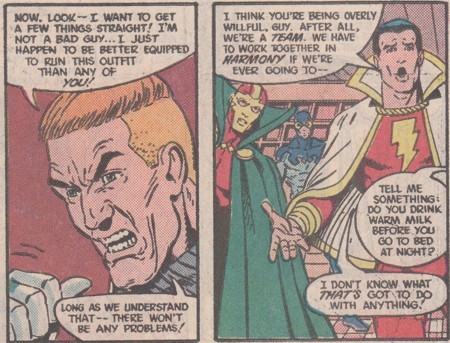
Captain Marvel earns a little of my love with this line as well. No shame in drinking warm milk at night!
This is only nine pages into the first issue and Guy has completely derailed the formation of the new Justice League. Was this blasphemy to previous fans of the Justice League where the team may have had some minor squabbles about various things and Batman would quit every six issues but mostly they didn't break out into brawls whenever they got together? Or were internal struggles and arguments a regular plot point? I have no idea because the only Justice League comics I read previous to this title were the terrible months where everything was breaking down and then Steel betrayed them and Vibe was killed off and Martian Manhunter felt like a huge failure. Although was Aquaman leading the team at the time? I dislike Aquaman so much, I'm just going to believe he was leading the team and that's why everything completely fell apart. He sucks. Once per day, I think about that lousy meme trying to prove Aquaman wasn't useless by using the image from New 52 Justice League where he controls a bunch of great whites to breach and kill a bunch of parademons and I hate everybody who actually thought that was a cool moment. Batman and Doctor Fate arrive in the middle of the Justice League brawl (which even Martian Manhunter, the only adult in the room, is taken part in) and shuts shit down The Batman way.
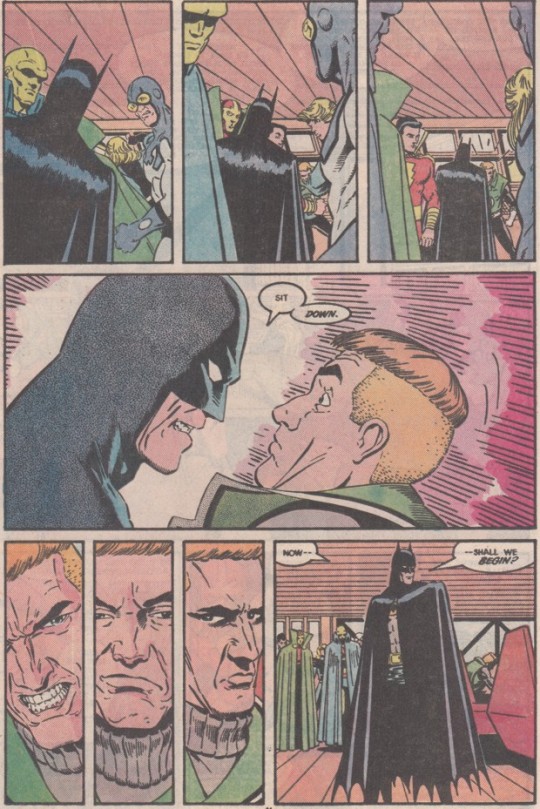
I guess heroes are also a cowardly lot.
Meanwhile, Doctor Light winds up being held hostage with the rest of the United Nations by some white terrorists. I felt I needed to say they were white because a lot of racist assholes can only envision terrorists one way. Also, I should always describe people as white when they're white since I don't want to be an accomplice to maintaining a world where we assume a person mentioned is white, male, and heterosexual unless they're described more fully. Doctor Light was given a Justice League emergency beeper by a mysterious figure some time previously. This isn't revealed but I just read Justice League Spectacular #1 so I know Maxwell Lord gave her the device so that she could alert the Justice League when the United Nations was taken hostage by terrorists that Maxwell Lord IV paid. It's all about getting some early press! There's an advert for the new Flash which I'm surprised I didn't pick up since the advert shows him having some kind of accident in a sperm bank.
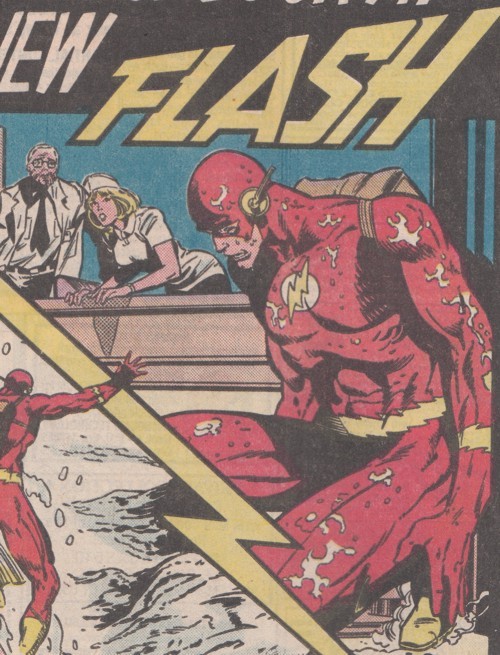
Ew Flash is right!
The Justice League head over to stop the terrorist attack. At some point, Doctor Fate disappears to go do something else and I think he never comes back? Is that why I barely remember him as a part of this league? Was he just there to look cool on the cover and fool all the lovers of DC magic users? The League storms the UN, murdering several terrorists.
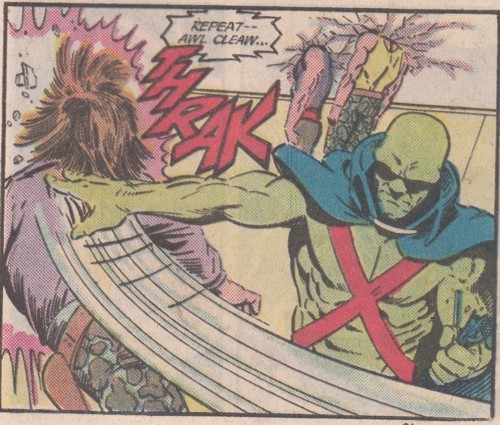
Look. Manhunter either phased their heads into the solid ceiling or he smashed their skulls straight through the roof. Either way, I don't see a high percentage chance of their survival.
The Justice League capture all the terrorists and then Batman has the building evacuated, leaving just the leader of the terrorists alone in the United Nations building threatening to kill himself so that the bomb attached to his heart would detonate and kill them all. He does kill himself but the bomb doesn't detonate. And the thing is, Batman realized during the mission that the bomb was almost certainly a bluff. So he left the man alone to kill himself. Later we discover the man had a history of mental illness. So this, to Batman, is justice? Batman almost certainly realized the man was being manipulated and that he'd definitely kill himself to blow the bomb and Batman let the man do it. Batman is a fucking monster. After the event, the media points out that the terrorists were mostly composed of 60s radical groups like the Weathermen and the Black Panthers. Which is odd because there wasn't one black terrorist in the bunch. The issue ends with Max Lord talking to himself and admitting to being the one who staged the terrorist attack. He also knew the leader was unstable enough to kill himself for the cause and he sent him in with a bomb that definitely wouldn't blow. So he's a fucking monster as well. And Martian Manhunter is a monster, not because he's a weirdo martian, but because he basically popped the heads on a few of the terrorists. No way will I believe those guys hanging from the ceiling by their necks survived! All in all, Guy Gardner is starting to look like a rational member of this group! Justice League #1 Rating: B+. A better than average start to the new Justice League, building some intrigue and conflict right from the start. Who is Max Lord? What are his plans for the Justice League? Why is he acting like it's his group? Will Doctor Fate ever return? Will Oberon poison Guy Gardner? Will Black Canary and Doctor Light become best friends because they're the only women in the League? Will Guy Gardner and Batman ever come to blows? I can answer that! They will not! They'll just come to blow. One punch by Batman. And that one punch causes some severe psychological trauma to Gardner and nobody thinks he should get medical help simply because he starts acting nicer. They're all fucking monsters!
19 notes
·
View notes
Text
JACE ISAIAH TORRES ⁏ thirty-four ○ security for lux & elias morgan’s right hand man ○ downtown.
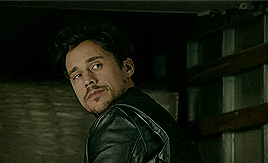
❝ APOCALYPSE BOY, YOU WON’T DESTROY ALL YOU TOUCH. YOU ARE MORE THAN YOUR DARKNESS AND MORE THAN THE DEATH YOU CARRY IN YOUR HANDS. ❞
⇨ aesthetics ⍮ the scent of fire and gasoline, a tall stature adorned in all-black attire, ghosts of bruises staining calloused skin green, an old punching bag in the corner of an old office, a towering figure shrouded in darkness as they linger in an empty church, bloodied noses and busted knuckles, a scuffed zippo lighter in a pack of marlboros containing only one cigarette, black shirts with the sleeves rolled up to the elbows, a sly smirk under stormy dark eyes, a sniper on the roof of a deserted building, the roar of a 1967 chevy impala engine, & a crumpled, worn family photo stuffed inside a wallet.
ALOHA !!! waddup, angels ?? it’s me, back at it again with another character bcos i have zero self control so here i am !! i’ll save you all from having to put up with my pointless babbles and get straight into it. as always, pls feel free to hmu on ims or discord ( chrissie.#9606 ) for plots and connections !!
FUNDAMENTALS.
full name. jace isaiah torres.
current age. thirty-four.
birthday. january 2, 1986.
gender. cisgender male.
pronouns. he / him.
nationality. british.
religion. raised roman catholic but no longer practices.
hometown. knightsbridge, london, england.
past residence. oxford, oxfordshire, england.
current residence. downtown, crystal city, united states.
sexual orientation. heterosexual.
romantic orientation. heteroromantic.
education. attended oxford university for a year before dropping out due to his mother’s passing.
occupation. security at violet, & elias morgan’s right hand man.
CONNECTIONS.
birth mother. katherine torres. †
birth father. alexander torres. †
step-father. nicholas carmichael. †
full blood siblings. none.
step-siblings. none.
maternal grandmother. julia monroe. †
maternal grandfather. andrew monroe. †
paternal grandmother. elizabeth torres. †
paternal grandfather. michael torres. †
maternal aunts. none.
maternal uncles. peter monroe.
paternal aunts. lucilee monroe, & miranda monroe.
paternal uncles. benjamin torres.
PROFICIENCIES.
spoken languages. english, & spanish.
negative traits. cunning, unfeeling, arrogant, cynical, & temperamental.
positive traits. astute, debonair, adroit, resolute, & adept.
strengths. sophistication, etiquette, professionalism, resourcefulness, integrity, delegation, honest, strong-willed, responsible, calm, practical, & a jack-of-all-trades.
weaknesses. impulsive, hot-tempered, stubborn, insensitive, judgmental, & by the book.
skills. skilled with firearms and other weaponry, hand-to-hand combat, lock-picking, carjacking, knowledge of automobiles, knowledge of the law, tracking people down, & excellent critical thinking and problem-solving abilities.
talents. piano, retaining information, memory recall, & marksmanship.
APPEARANCE.
eye colour. dark brown.
hair colour. dark brown.
height. six foot.
weight. 70 kg.
build. both tall and considerably broad, he is toned with an evident definition in his muscles.
scars. too many to count at this point.
tattoos. tba.
piercings. none.
glasses. n/a.
prominent feature. sharp, angular jawline.
MISCELLANEOUS.
zodiac. capricorn.
element. earth.
house. gryffindor.
myers briggs type. istj-a.
alignment. true neutral.
enneagram. type five.
temperament. choleric.
intelligence type. linguistic.
character label. the opaque.
past mental disorders. post-traumatic stress disorder, insomnia, & alcohol abuse.
current mental disorders. mild post-traumatic stress disorder, & insomnia.
addictions. alcohol, & tobacco.
vices. lust, wrath, & pride.
virtues. temperance, charity, & diligence.
allergies. n/a.
diet. carnivore.
accent. british.
dominant hand. right.
blood type. ab positive.
felonies. none.
vehicle. black 1967 chevy impala.
BACKGROUND.
TRIGGERS. car accident, death, domestic violence, drugs, violence, blades, stabbing, blood, & murder.
Born into a world of tenderness and light, Jace's arrival into this universe was a moderately placid one. The instant he opened his eyes to the world, he was a cherished and adored baby boy. This was how the young boy assumed his life would continue to play out: showered with affection and admiration, given endless love and support by both of his parents. With his father, Alexander, a renowned criminal lawyer and his mother, Katherine, an equally as esteemed neurosurgeon, the Torres family were respected, affluent and forefront in their community. Always hosting charity events, attending fancy galas, prominent figures at every fundraiser, the Torres' seemed as normal as just about any aristocratic London-based family. One might just say that Jace was destined for greatness — primed for success. Of course, all eyes of the extended Torres family were on the boy, watching and waiting to see how his story would unfold. Would he follow his father’s footsteps? Or his mother’s? The idea of him paving his own path had failed to cross the minds of them all.
From a young age, Jace had been incredibly intelligent and adept, his keen perception proving to extremely surpass that of his age. He was able to captivate others with both his appearance and his capabilities. Those in his company hung off his every word, often discovering themselves enthralled by a charming and sincere young boy. Regardless of his family’s secured position in society and their abundance of riches, Jace never looked for much more than their approval and their devotion. It is perhaps this fact alone that makes the next chapter in his life one of those unbearable moments that seem to live on for the rest of eternity, an emotion so overwhelming that it lingers in your bones until the end of time — rattling them every so often to remind you of the pain. The tenth instalment in the story of Jace’s life is what he would nowadays refer to as the beginning of the end. All of the light and love that he had encountered throughout his life up until that point had only been leading him to the tragedy and devastation that would prevail from that day henceforth. The night that Jace had been sat down by his mother and told that his father had met his fatal end in a horrific car accident was the same night that Jace lost a piece of himself. A ten-year-old boy endured his first heartbreak then. And, unfortunately, the torment refused to cease. Jace’s existence prior to the horrendous atrocity that altered the very fabric of his nature endured for what would now seem to him a fleeting period in time. Yet, throughout those ten years of normalcy, every transient second aided in concocting the basis for all that was to come.
Within the span of a single year, Katherine had found herself in the clutches of what Jace would grow to describe as a vulture; a man of a lower class who latched onto his mother — leeching off her riches while abusing her in the process. Soon, this man, Nicholas Carmichael, became Jace’s stepfather and things only dipped further south afterwards. Nicholas drank copious amounts of liquor, ran around behind Katherine’s back, smacked at Jace for defending his mother and the list went on. He manipulated Katherine, made her pick a side, tore her relationship with Jace asunder. Nicholas was indeed an angry, offhand man who often resorted to acts of violence toward both Katherine and Jace. During this time, and within the blink of an eye, Jace turned hostile and indifferent. It was as if he had transformed into a polar opposite version of what he’d always been — metamorphosing into an alternate version of his old self. Once a sheltered child who knew nothing but warmth and consideration, Jace was soon neglected, discarded and left to fend for himself. It was enough to turn him into a colder, less vibrant boy who soon became void of emotion and attachment. He picked fights with his stepfather for the sheer kick he got out of it, rebelled against his mother and found his once soft heart hardening as a result of years of enduring torment at the hands of Nicholas.
Unfortunately for Jace, he’d stepped out of line one too many times and aged eleven, he found himself sent off to an all-boys boarding school. In one way, he was thankful to be shot of the horrid creature who claimed to be his stepfather. Yet, on the other hand, he spent sleepless nights worried about the mortality of his mother. All in all, though, his time spent in the educational facility was a positive one. He made friends, excelled in all of his classes and extracurriculars. For the years that Jace boarded at the school, his life seemed to be steering him down the right path. Once he graduated, he’d decided to follow the same path as his father: criminal law. He felt it was the right thing to do in order to honour his father. Jace wound up attending Oxford University where he resided in a dorm, visiting his mother on the weekends. However, as all good things do, they come to an end. In Jace’s case, his few years of bliss and contentedness arrived at a rather abrupt halt, taking a severe nosedive. He was nineteen when he learned of his mother’s passing and, ultimately, lost control of himself and of his path in life. He dropped out of university, moved back home and spent many months alone and aimless; desperate to find answers behind his mother’s suspicious death. Of course, Nicholas was nowhere to be seen. He hadn’t even had the decency to show his face at Katherine’s funeral. One thing was for sure, though: he’d walked off into the sunset with the Torres fortune, presumably never to be seen again. The details outlined in Katherine’s autopsy report had been vague and nobody seemed willing to help Jace in his search for answers. Though that did little to deter him from continuing to hunt for the truth behind his mother’s death. Without a shadow of doubt in his mind, Jace knew deep down that Nicholas had been responsible but with no evidence, the idea of justice being served seemed to drift further and further out of reach.
Eventually, after years of fighting and persisting with his mission, Jace was able to uncover concealed elements of Nicholas’ background. As it turned out, the man was involved in gang activity and played a prime roll in drug trafficking throughout the streets of London. Though, still failing to get his hands on any kind of proof of Nicholas’ involvement in Katherine’s murder, a twenty-three-year-old Jace began to ponder if he should continue down this road. Tracking down his stepfather had consumed Jace whole, rotting him from the insides out. For so long he’d been holding onto an immense amount of resentment and wrath that he’d become bitter, hostile and obsessed. He knew it would only end in disaster if he continued to cling onto his vendetta and so for the following year, Jace pressed pause on seeking the truth. At least, until he’d happened upon a new lead that indeed confirmed his assumptions about Nicholas’ role in Katherine’s death. This was the break that Jace had been desperate for — the fuel that added flames to the fire within his belly. With new information and a penchant for revenge, he set off on his previously abandoned purpose.
Admittedly, it had taken Jace months to successfully unearth the exact location of Nicholas and when he did, he wasn’t entirely sure what to do with the information. Still, he set off for New York City with plans of confronting the man. Part of Jace wanted nothing more than to make his stepfather suffer, to subject Nicholas to torture as appalling as what Katherine had undoubtedly endured. Another part of him wanted to reveal all the little details that he’d uncovered, to tell him he knew what he’d done and watch his stepfather wince in objection and pathetically string one faux apology after another. Neither of these scenarios played out in the end. Instead, Jace’s first encounter with Nicholas after all this time had an entirely different outcome than he’d anticipated. Managing to tail the older man to Lux, Jace decided to linger around outside in the hopes that Nicholas would make an appearance. As fate would have it, only a mere hour had passed and there he was, leaving the building alone; having been removed from the vicinity for hassling one of the dancers. As Nicholas made his way to the back of the club, Jace followed in the shadows. Stood at the edge of the establishment to watch his stepfather from afar, Jace considered the endless possibilities that had entered his mind the second he set eyes on the man who’d destroyed his life.
When Jace eventually approached his stepfather, the look that claimed Nicholas’ face was one of incalculable shock and Jace couldn’t help but feel a twisted sense of pride in how his sheer presence brought about such dismay in the other man. He had to admit though, that it sent a strange twinge of nostalgia mixed together with dejection down the length of his spine. Jace had a collection of cruel words and obscenities he so desperately wanted to hurl the older man’s way. Alternatively, he opted for asking a question that had been haunting his warped mind for almost a decade. “Tell me, Nicholas. Why did you do it? Why did you murder my mother?” The inquiry almost made the other male tumble out of his shell even after he admitted that yes, he had been the one to end Katherine’s life and lacked even a shred of remorse. There was something in Nicholas’ blasé tone of voice that triggered an immediate rage deep within the pit of Jace’s stomach, bubbling and bubbling away, rising up and up until the only colour he could see was red and unfortunately for Nicholas, he was on the receiving end of Ross’ explosion. Moving in a flash, before he knew it, Jace was invading Nicholas’ personal space and the small blade he had been carrying was sunk into Nicholas’ abdomen.
Finally, once Jace had recoiled and his fists that had been balled into the fabric of Nicholas’ jacket eventually unfurled, his dark eyes took in the sight of the elder man’s towering figure collapse to the ground beneath him. Dropping his gaze to his hands, Jace noticed the way that the colour slowly began flowing back into his knuckles that had been white from the thin skin stretching tightly over the protruding bones. Flipping over his uncurled palms, Jace noted the way his hands trembled only marginally less than he expected they would be. It was the shrieking resonating in his ears that brought him to divert his attention toward Nicholas who was writhing around on the ground as a result of his suffering and loss of blood. Jace knew he had to get out of there — that he had to leave before he’d give anyone the chance to flock toward the screams and clap their eyes on his guilty face. As he backed away, watching the actions of his decision unfold, the feeling inside his gut was different than he imagined it would be. He had made the decision to kill Nicholas, there and then in the heat of the moment and it was a gradual and torturous death. A death inflicted by him deliberately, no matter the fact that it wasn’t premeditated. Lacking the desire to stick around and witness Nicholas’ final screech, Jace ran and before he even had the chance to allow any sort of repentance to seep into his body for what he’d just done, a gathering of men stepped out of a dark alleyway in front of him just footsteps away from the scene of the crime. There was something about the way in which they emerged from the darkness that caused Jace to immediately cease in his footfalls and as he briefly surveyed the area he realised there was nowhere left for him to run — there were too many of them and although he tried to fight them off, he was vastly outnumbered.
How Jace had managed to defend himself against the others, able to hold his own and give as good as he got, was beyond him. In the end, he pegged it down to sheer luck. Despite such a fluke, he was far from being out of the woods. Having witnessed the murder of Nicholas and how Jace had been able to stand his ground against the group, the eldest of the group of men had stepped forward to explain that he could use a young man of Jace’s stature and expertise. This was precisely how a then twenty-five-year-old Jace wound up entangled with the Berk-Morgan family. Initially, he was hired as a security for the same club that he’d slaughtered Nicholas outside of. After quite some time as an associate, he befriended Elias Morgan; soon becoming a confidant and someone the other trusted. Of course, the trust was mutual. And this has brought him into the position of becoming Elias’ right hand man. Now thirty-four, with nine years of experience under his belt, Jace is worlds away from the man he used to be. A shell of the man he used to be. Simply put, Jace has resigned himself to the reality that happiness is never going to be an emotion he will feel in his heart. He is closed off and secluded. He is mysterious and holds everyone in his life at arm’s length, afraid to let them in; only permitting people to see what he wants them to see and know what he wants them to know. His life is full of a myriad of memories soaked in blood and torment. A plethora of crooked dealings and immoral acts. But this is his life now and he isn’t prepared to give up the good fight – not after everything he has gone through just to be exactly where he is right now. A fighter has always lived inside of Jace Torres.
WANTED PLOTS.
give me all of the connections from friends, frenemies, enemies, hookups, exes, rivals and everything else in between. added bonus if there’s angst or drama. if you have anything in mind feel free to throw it at me, i’m open to the majority of things and have zero triggers so come at me bro !!
9 notes
·
View notes
Text
So you think ‘cis’ is a slur
So you think ‘cis’ is a slur. Well, alright, then. Maybe the way people have been using it has been offending you, maybe you don’t identify with the word for that reason. If that’s the way you really feel, I won’t call you cis. Can’t force someone to identify with something they don’t. And if you and a majority of people who identify with the gender they were assigned at birth agree, then maybe we should stop calling you cis.
Fact is, that’s not the case.
The other fact is, even if that was the case, it leaves you labelless.
And what’s wrong with that? Well, labels are important. They help people see who’s like them, and who’s not. So if you think cis is a slur, and you really, truly think it’s being used to oppress you, and take away your rights, then you’re gonna have to come up with your own label.
And the same goes for any other group. If most straight people said ‘straight and het are slurs’, if they really, truly believed that those words were being used to oppress them, then we’d need you to come up with your own word to describe the experience of being attracted to the opposite, and only the opposite, gender.
Likewise, if all allosexual people decided that allo was a slur, and they’d been repressed for being allo, I’m sure our ace siblings would call us by whatever we decide our new label is.
But, once again, that doesn’t happen.
You see, for something to be a slur, it can’t just be something that people have said in a few jokes, or told you that ‘this group is not this other group’. That’s not a slur. That’s a label.
If allistic, sometimes also called ‘nautistic’ (pronounced ‘not-istic’) people felt those were slurs, then I’d stop calling them that, and call them by what they want to be called. If neurotypical people as a whole did the same thing, then, sure, find something else, and I’ll call you that. Although, actually, I’ve never heard that being said before. What’s different about neurotypical, I wonder?
You see, these words aren’t slurs. Nobody has oppressed you by calling you them. You won’t hear people insult you based on those. Nobody has called you a ‘flaming het’ or a ‘great big straight’ nobody unironically uses ‘cissy’. No one has used ‘mentally allistic’ or, when someone else has done something wrong, or bad, or silly, said ‘that’s so nautistic’ Nobody says that allos are sluts for being allo.
Because those aren’t slurs.
In the above examples, I’ve replaced actual slurs with what you claim to be slurs. Well, the last one, in fact, isn’t a slur, as far as I’m aware, just as slut isn’t an identity. It’s prude, by the way.
But, sure, you want your own word. Alright, then. Choose one.
Except, the one you want is ‘normal’. Normal isn’t a label. Nobody’s normal. You say that straight (and allo), white, cis, able-bodied, neurotypical men are the norm. Probably because you fit at least one of those categories. I do, too, by the way.
But privilege isn’t normal.
Most people aren’t white. More and more people are coming out as not straight, allo or cis because it’s becoming more accepted, to the point where some people say that cisgender heterosexual heteroromantic make up under half of the population. More people are being diagnosed, or self-diagnosing, as autistic. More people are discovering that they’re other divergent neurotypes too. ADHD, DID, OSDD. The list goes on, and, in the case of DID and OSDD, there are at least two people per body, although, I’m not sure if they’re counted in scientific terms, because... Well... Yeah.
There’s less backlash against ‘neurotypical’ because it has ‘typical’ in the name. You don’t want labels. You want to be told you’re normal. That we’re other. That we don’t belong.
And that’s not OK.
But, yeah, if you really think cis is a slur, and it really is used as a slur, come up with your own label. I’ll use it, so long as it isn’t claiming that I’m not as valid a human being as you.
4 notes
·
View notes